

TAKE THE LEAD 110 YEARS OF LEADERSHIP
The Magazine of the MLC School Family
CONGRATULATIONS CLASS OF 2023
Autumn/Winter Edition 2024
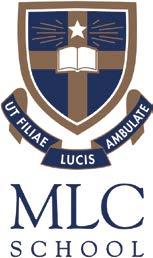
MLC School’s goal for each girl when she graduates is to be:
– Compassionate to herself, interacting with others with kindness and celebrating diversity
– Courageous in her pursuits, expressing herself honestly and with integrity to live a life with purpose
– Capable of navigating change, showing leadership in adapting to the multiple paths that her future will take
– Connected to the legacy of MLC School, using it to inspire her to be an agent of change in her world
EDITORIAL
Michele Dunn
Barbara Hoffman
Amelia Morgano
PHOTOGRAPHERS
Nicole Anderson
Wendy Chung
Tracy Mock
Amelia Morgano
Maria Rulloda
MLC School community
SOCIAL MEDIA
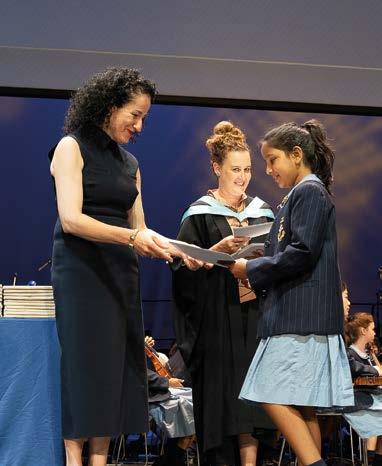
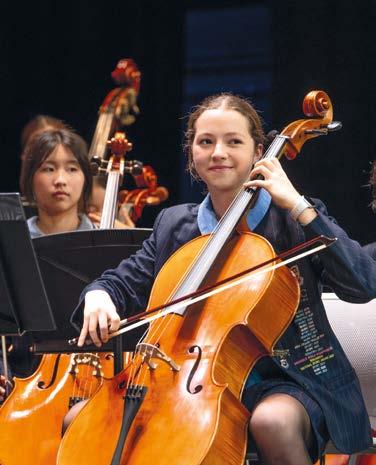
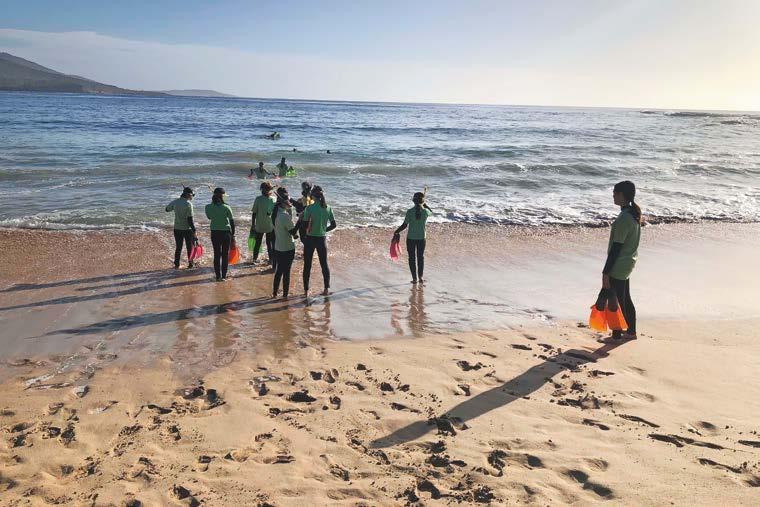
Contact Us
Ph 02 9747 1266 General enquiries enquiries@mlcsyd.nsw.edu.au
Office Hours
MLC School hours are 8am to 4pm weekdays
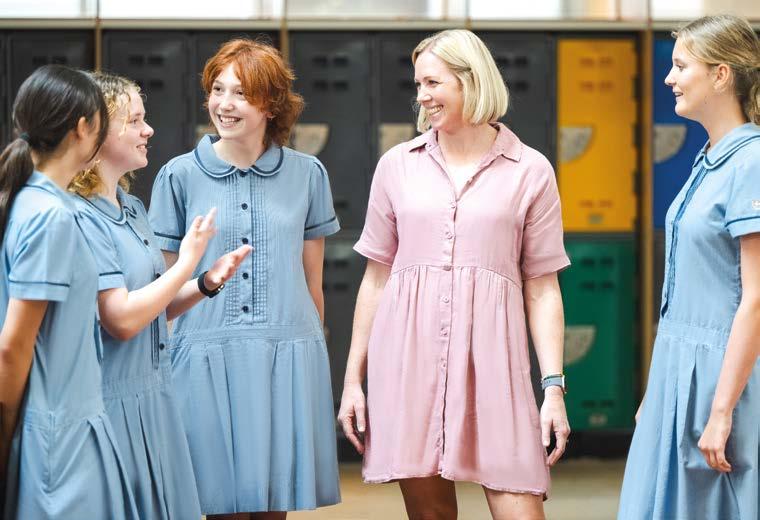
MLC School acknowledges the Traditional Custodians of the land on which the School is located, the Wangal people of the Eora Nation, and pays respect to Elders past and present.
8 and 9
LinkedIn
Facebook
Instagram
16 EXPLORING CONTINUOUS CONNECTION SPEECH DAY AND SPEECH NIGHT 10 CLASSROOM TO CAMPSITE
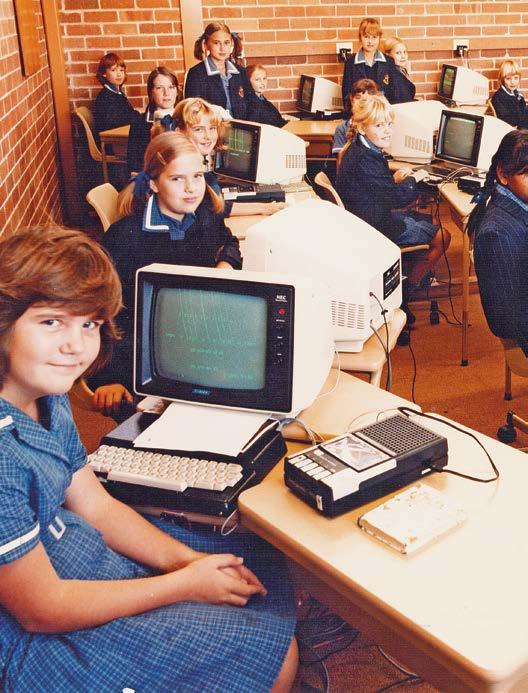
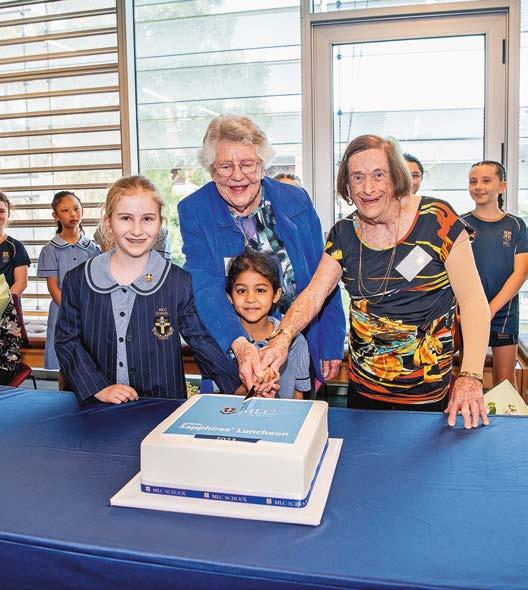
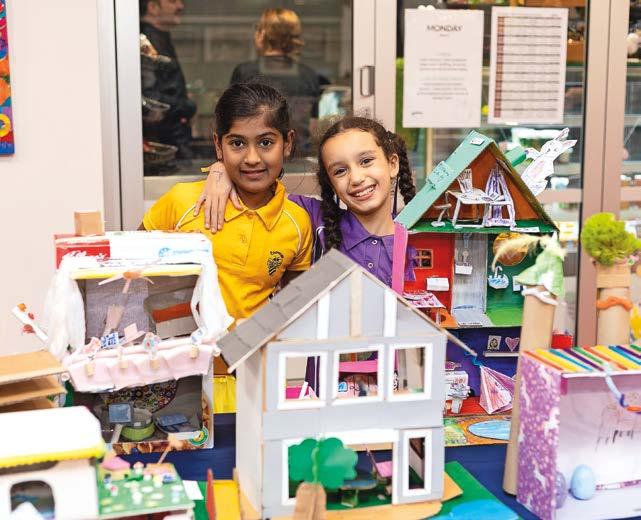
TAKE THE LEAD: 110 YEARS OF GIRLS' 23 LEADERSHIP DEVELOPMENT 36 HIGH TEA CELEBRATES FAMILY TIES 44 A SIGN OF THE TIMES CREATIVE CRAFTERS ANNUAL SAPPHIRES' LUNCHEON TEACHING TECH 18 ALSO INSIDE THIS ISSUE 40 31 Cover photo: Girls at Crazy Hair Day in the Junior School 3 LUCIS AUTUMN/WINTER 2024
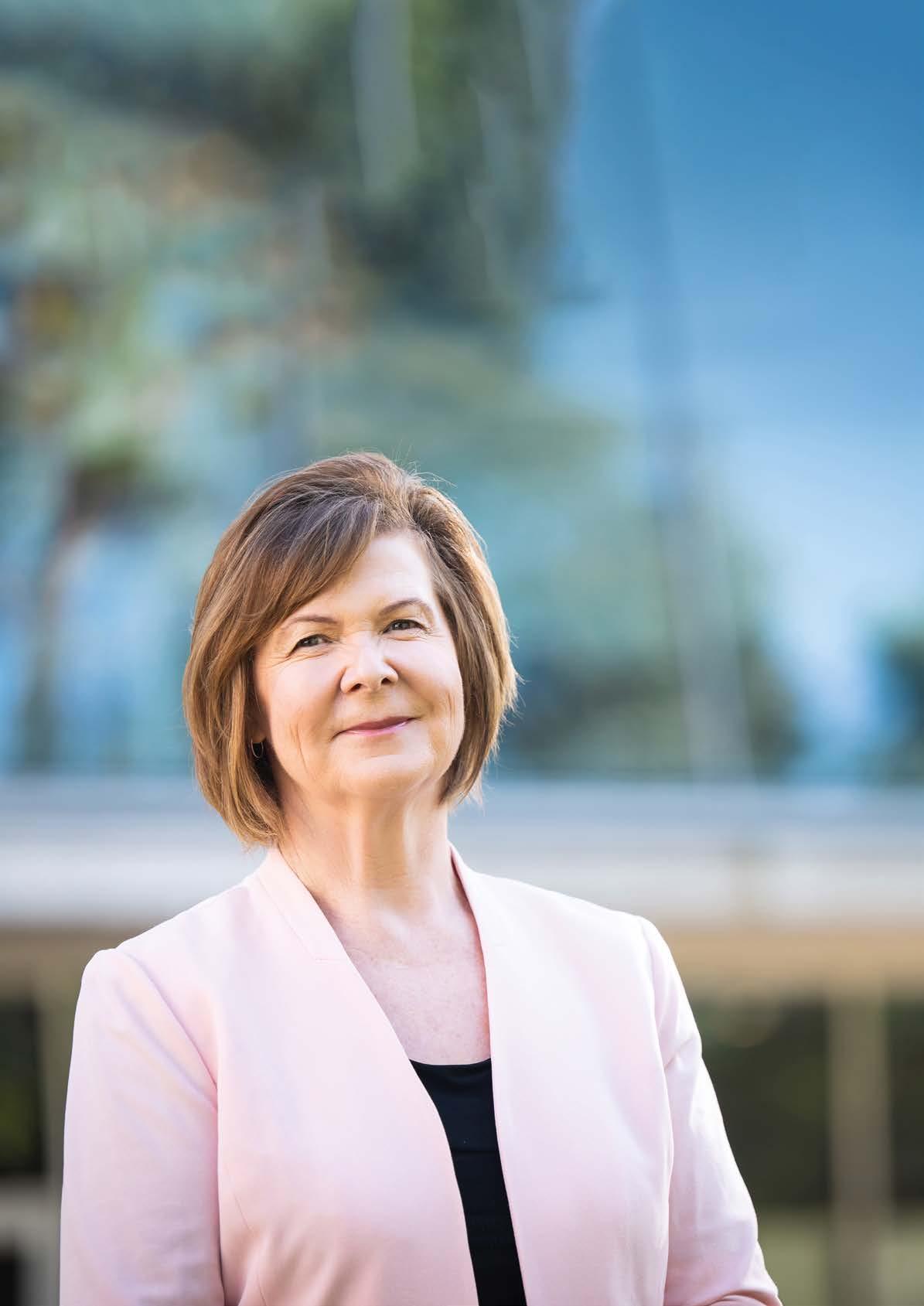
from the PRINCIPAL
LISA MOLONEY / PRINCIPAL
4 MLC SCHOOL

It’s profoundly inspiring to look back at the 110 years of leadership at MLC School in this edition of Lucis. As we all know, leadership can take many forms, both formal and informal, and the formal structure has certainly evolved over time here. Unleashing the potential of all our girls to lead, by providing them with a wide variety of opportunities to do so, is of great importance.
We are keenly aware that MLC School helps shape the women of the future, and our ambition is to ensure they are equipped with experience and skills to help them influence others and their world when they move beyond the school gates. Redesigned portfolios for Year 12 leaders, such as Diversity Captain and Adventure Captain, reflect new areas for which the student body sought representation and greater input. Our girls are to be applauded for their strength of voice and dedication to make a positive impact across the School. Equally, the Year 5 leadership structure is unique to MLC School and helps to build confidence and commitment to service.
As a proud leader of an all-girls school, International Women's Day holds a special significance for me as well as our student leaders. At the annual breakfast, we reflect on the various inequalities that continue to exist throughout the global community of women, and also tackle questions as to how we can make a difference. The responses shared by our panel of students revealed to me just how much progress we have made through instilling the School’s Values of Courage, Compassion, Respect and Growth in this next generation.
This issue of Lucis continues our series of advice for parents courtesy of Dr Justin Coulson, leading parenting expert and our first P&F sponsored Parent Forum speaker for the year. He has shared a few of his own tips to strengthen parent-child relationships.
Taking advantage of technology and its capabilities is one area where our School has led the way for decades and our history here is remarkable. Our new Director of eLearning, Marianna Carlino, will continue to prepare our girls to face all manner of technological challenges and enable them to seize the opportunities presented by the constantly evolving digital landscape.
As valuable as technology is, having time ‘off-line’ is just one reason why MLC School places a strong emphasis on camps and immersions to take learning beyond the bounds of the classroom and provide challenge and discomfort. These experiences not only provide students with a break from their daily routine, more importantly, they help them build confidence, independence, resilience, and leadership skills. Immersions are invaluable in shaping our girls into resourceful, tenacious individuals and these experiences are fundamental to an MLC School education.
I am sure you will enjoy reading about these and other initiatives in this edition of Lucis
5 LUCIS AUTUMN/WINTER 2024
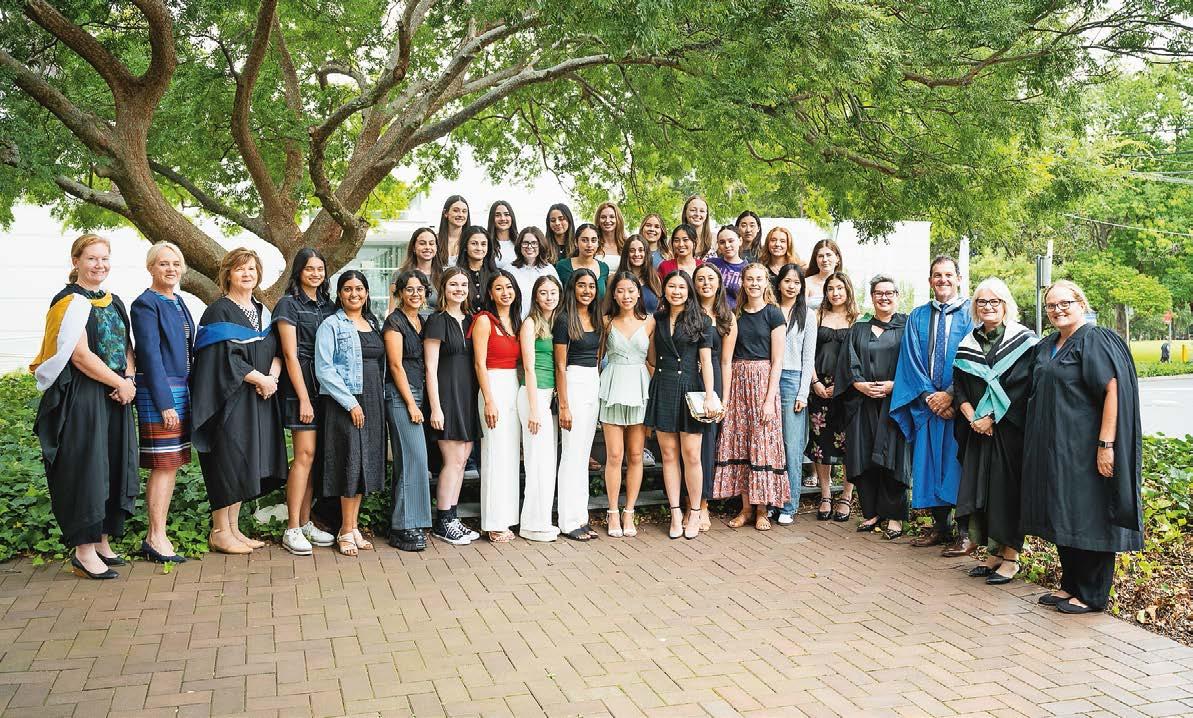
CONGRATULATIONS
CLASS OF 2023
Students from the Class of 2023 were acknowledged at the Academic Excellence Assembly in February. With family and staff in attendance, many of our newest Old Girls were recognised for HSC Showcase Selections and Nominations, and Excellence in Academic Achievement Awards for placing first in the MLC School cohort course after their final HSC and IB examinations. We celebrated 26 students who achieved an Australia Tertiary Admission Rank (ATAR) of 97 or above* (10 of which were over 99).
Anna Xu was awarded the Reverend Dr Charles J. Prescott Medal for the highest ATAR achieved for their year* – the maximum of 99.95.
Ros Pesman Medals for a State ranking in a HSC subject honours MLC School Class of 1954 student, Emeritus Professor Ros Pesman AM née Cooper, who has achieved many firsts for women; the first woman including to be elected Chair of the Academic Board at The University of Sydney and the first woman to be appointed to the Challis Chair in History. This year's Ros Pesman Medals were awarded to Mimi Jones, who achieved Second in State for HSC Ancient History, and Romy Dobbie for Fifth in State for HSC Entertainment Industry Examination.
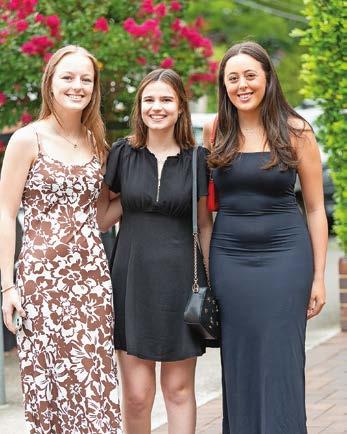
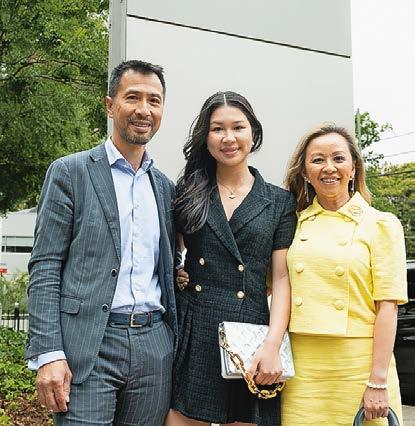
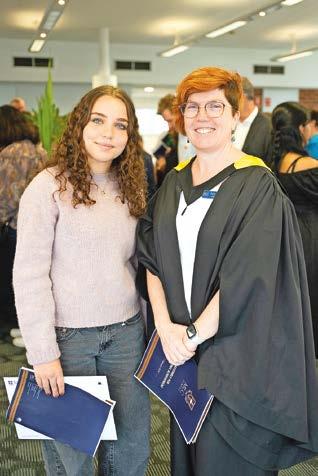
6 MLC SCHOOL


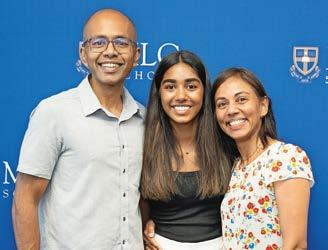
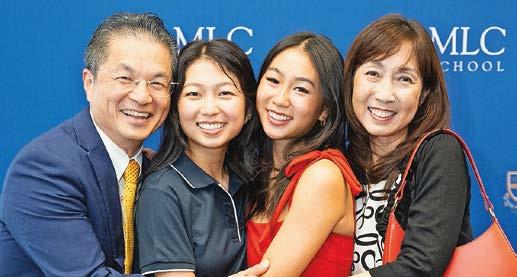

Here are just a few highlights from the girls' time at MLC School:
• 'MLC School has taught me to be an independent person and has taught me the value in friendships as well as the value of women. Listening to all the achievements students and past Old Girl students have achieved has taught me the capability of what women can do and how much they can change the world.' – Hannah Kang
• 'My favourite memory at MLC School is travelling to Cape York in 2021 for the Red Earth Immersion and getting to learn from and connect with Indigenous communities on their homelands.' – Claudia Padman
• 'MLC School has helped me become the leader and confident individual I am today giving me the education and inspiration to find my passions and learn to speak up for them.' – Elizabeth Wilkie
x S

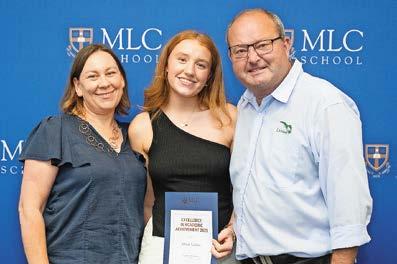
27
All Round Achievers HSC Distinguished Achievers list and Certificate of Distinction for Diploma Programme
29 nominations for HSC Showcases
Just under 50% of our students achieved an ATAR of 90 or more
Scan to learn more about their success
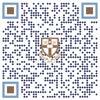
*Please note: the School receives HSC students' ATARS, but we rely on IB students letting us know their ATAR, and all students providing permission for this information to be shared.
7 LUCIS AUTUMN/WINTER 2024
SPEECH day

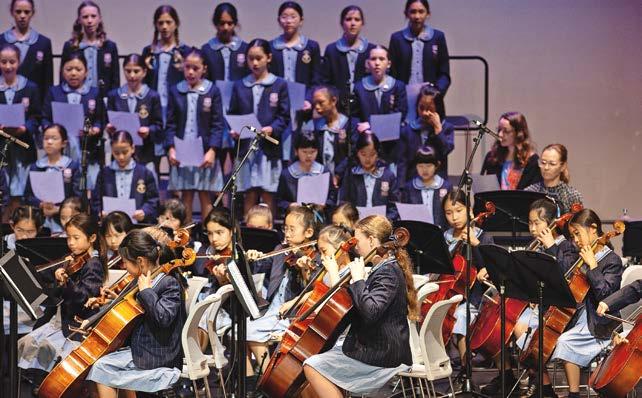
The annual celebration of academic achievement for girls in Year 3 to Year 6 was held at the International Convention and Exhibition Centre (ICC Sydney).
Angeli Choir took our breath away with their musical item Birrama Mana, composed by Deborah Cheetham Fraillon and Jessica Hitchcock. Rev Sally Yabsley-Bell also asked us to ‘let our light shine’ before taking up a position at Kinross Wolaroi School in Orange.
Head of MLC Junior School, Daniel Sandral, wearing a classic green and gold beanie with pride, reminded us of the groundbreaking accomplishments for women’s soccer, and sport more broadly.

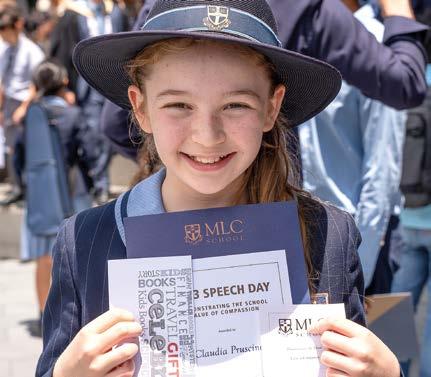

8 MLC SCHOOL
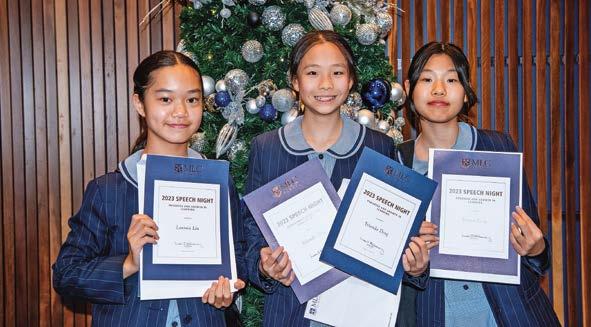
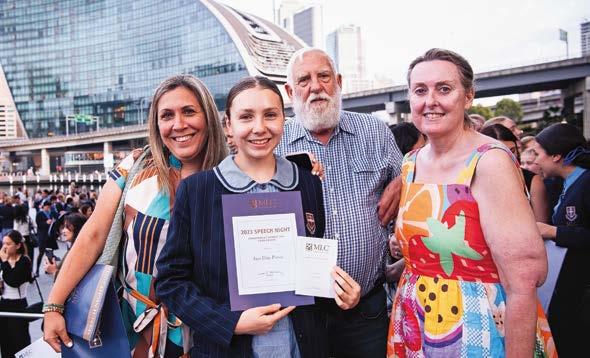
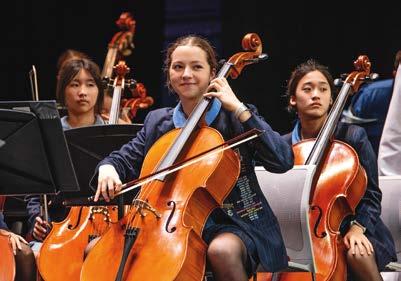
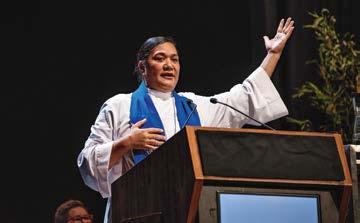
Girls from Year 7 to Year 12 2023 were celebrated as part of the 138th annual Speech Night.
The MLC School community warmly welcomed the new Moderator, Uniting Church Synod of NSW and ACT, Rev Faaimata (Mata) Havea Hiliau, who shared her fond connections to MLC School and reminded us about the power we all hold in the palm of our hands.
Long serving staff were farewelled such as Pam McGowan, a pivotal figure in the Technological and Applied Studies department for over 20 years.
The night ended with a powerful and heartfelt rendition of Don’t Stop, composed by Christine McVie and arranged by Kirby Shaw. The MLC School Senior Choir and Rock Band showcased their talents and heralded a much-anticipated summer break.


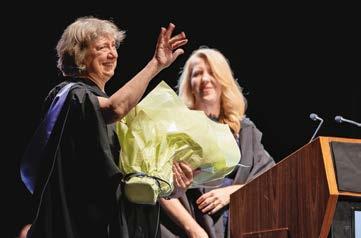
SPEECH
night
9 LUCIS AUTUMN/WINTER 2024

Classroom to Campsite Experiences That Educate
10 MLC SCHOOL

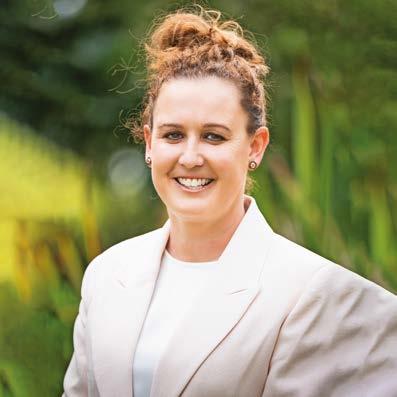
All the research is clear in stating that education is not just about learning within the four walls of a classroom. Experiential learning is more than just a buzzword; it’s a philosophy that recognises the importance of learning by doing. It goes beyond the textbook; it is about encouraging students to actively engage with material through real-world experiences.
The Experiential Learning Program at MLC School has a myriad of lenses. Some are long-standing programs and some that have been reimagined and are beginning again. They include co-curricular programs, service learning, immersive learning projects and trips, outdoor education, clubs and societies that are all student-led and more. These programs provide students with the opportunity to apply the knowledge and skills that they develop in the classroom to real-world contexts.
MLC School has a proud tradition of offering high-quality co-curricular programs that cater to the needs and interests of the individual. These programs support girls’ academic, social, emotional, and physical wellbeing, as well as fostering supportive, collaborative and creative communities across the Pre-Kindergarten to Year 12 continuum. Co-curricular programs offer the opportunity for girls to learn new skills as well as enhance their existing abilities.
We encourage them to discover new interests, work with others in a range of environments, acquire a personal leadership style and broaden their relationships (beyond their immediate peers). Over the next year, you will see more and more opportunities for cocurricular programs become available.
All our experiential learning programs are based upon Round Square and MLC School Values. Round Square is an international network of 200 like-minded schools across 50 countries on six continents; this educational organisation provides numerous opportunities for its global schools to connect, collaborate
and offer unrivalled world-class programs and experiences. The aim of the organisation is to develop global competence, character and confidence in young people.
You may not know that along with our cocurricular programs, the outdoor adventure and immersive learning programs which were re-designed during COVID-19 and are now re-launched, scaffolded from Kindergarten to Year 11.
‘The idea behind this invigoration is to provide a platform to achieve excellence; for our experienced team to empower and prepare the MLC School girl to be a courageous, compassionate and respectful global citizen’ says Sarah Jauncey, MLC School’s Director of Experiential Learning.
The outdoor environment encourages skills such as problem-solving and negotiating risk, which are important for child development1, as a Round Square School, ‘Spirit of Adventure is characterised by those who push themselves beyond their perceived limits, cross boundaries and discover that they are capable of more than they thought’.
Our adventure programs provide students with worthwhile, sequential, challenging (and fun) experiences, where they are not only learning, but stepping outside of their comfort zones. We offer a challenge-by-choice approach, which means for some students, just coming along and being away from home is a challenge big enough. For others, the ‘challenge’ is going on the giant swing, surfing or even climbing to the top of the climbing tower.
As Kurt Hahn said, ‘If we could see what we were capable of, for the rest of our lives we would be unwilling to settle for less’.
11 LUCIS AUTUMN/WINTER 2024

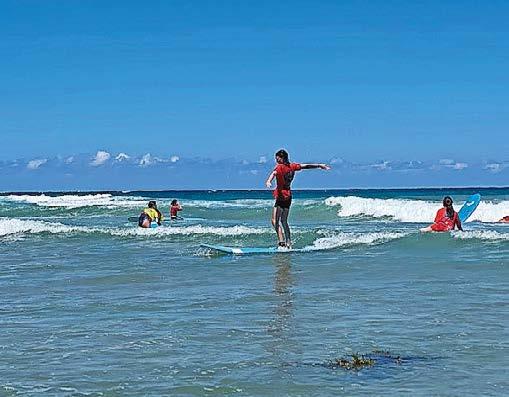
Below is a snapshot of what the new Adventure Program looks like across MLC School, year by year:
Kindergarten
‘Muddy Play Day’ is all about getting outside, rolling in the grass, getting dirty and finding out that there is more to being outside than concrete and synthetic grass. It is a day camp in the local area, so don’t worry – no overnight experiences just yet!
Year 1
‘Connection to Nature’ is a day camp to the Lane Cove National Park, where students go on a bush walk, jump in mud, build stick houses, play games and learn about the bush all around them.
Year 2
‘What is Camp?’ is held at the very end of Year 2 at Clifton Gardens. Students pack lunch and recess, and bring hats, rain jackets, swimming costumes and participate in rafting, kite making and beach games. They are also challenged to jump into the water.
Year 3
‘The Giant Sleepover’ is the start of overnight adventure camps at MLC School. It really is about surviving the night away from home for some students. We leave at normal school time and are away for one night.
Students learn about how to share rooms with other students, share meals together in dining halls, and experience being away from the comfort of home. While away, they get to go on a giant swing, climb walls, go bushwalking and participate in Indigenous bush lessons.
Year 4
‘Bush Bonza’ is a camp in a totally different environment. It is held during winter in in the Southern Highlands, so it is chilly! Students not only learn about how to dress appropriately for the temperature, but they get to experience the beauty of the bush by having campfires at night, climbing walls, bush walks, mountain bike riding and the MLC School talent show. A famous part of the Year 4 Adventure Camp is experiencing the wonderful food by ‘Cheffery’!
Year 5
‘Surf’s Up’ is a program designed to get to know new students at MLC School, as well as create and learn about leadership. The students learn what it means to leave the accommodation in the morning and be out at activities all day. They need to plan and pack everything for the day, learn independence and consequences for when you forget to pack your snacks. This is a coastal-based program so students have an opportunity to learn to
surf, snorkel, play beach games and complete a coastal walk.
‘Democracy Immersion’ involves travel to Canberra in Term 4 for three days and two nights They have a jam-packed time; visiting Parliament House, the Australian War Memorial, Questacon, the Australian Institute of Sport, the National Electoral Education Centre, the National Capital Exhibition, Government House and the National Gallery of Australia. This all coincides with classroom learning about Australia’s democratic systems.
Year 6
‘Marine Biology’ is a trip for one night and two days working with marine biologists. They learn how animals adapt in the ocean when they are snorkelling and then in touch tanks. Students learn about other animals adapting to their environment at Taronga Zoo.
‘Celebration’ acknowledges the end of primary school. Students sleep in tents, play games, abseil, go mountain bike riding, ride waterslides… The Year 6 Adventure Camp has it all!
Year 7
‘Relationships’ is a three-day adventure that involves sleeping in tents, surfing, canoeing, and getting to know each other through games and challenges. This adventure is specifically held in the first three weeks of the year to enhance connections.
1 S Brophy, E Marchant and C Todd, ‘Outdoor learning has huge benefits for children and teachers — so why isn’t it used in more schools?’ The Conversation 4 June 2019, viewed March 2024, https://theconversation.com/outdoor-learning-has-huge-benefits-for-children-and-teachers-so-why-isnt-it-used-in-more-schools-118067
Year 7 Relationships
12 MLC SCHOOL
Year 5 Surf's Up
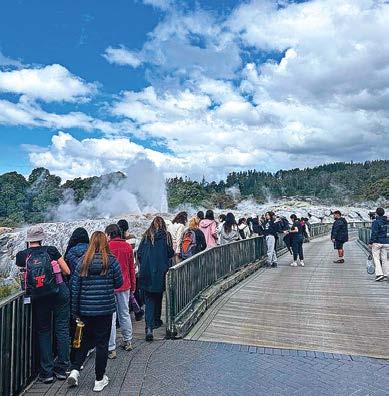
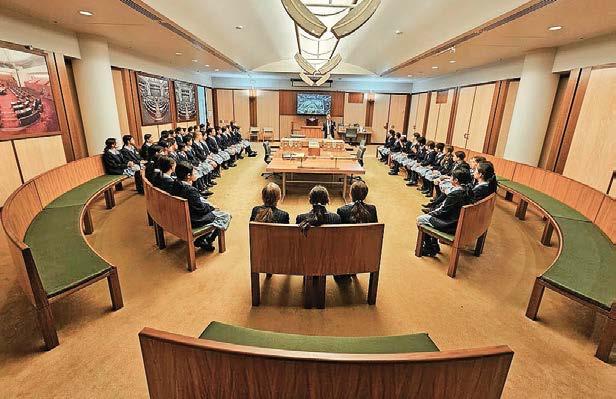
Year 8
‘Sense of Place’ Immersion is an important first step in developing our students’ understanding of the Indigenous experience in modern Australia. We see the importance of the MLC School student understanding the story of the land on which she gathers daily; an understanding that goes beyond the Acknowledgment of Country she hears at assemblies and special events, in the hope she can be an agent of change within her community and more broadly in society. Students have an in-school program and travel to the central west area in New South Wales for a week. While away, students work directly on country with local First Nations people.
Year 9
'Urban Challenge' is a three-day program filled with fun and adventure, in an unfolding journey taking them around the Sydney CBD and surrounding suburbs. They organise their food, travel and selves as they navigate and negotiate their way across the city. Students learn about teamwork and real-life lessons, such as the fact that public transport will not wait for the slow team!
Year 10
'International Immersive Learning' trip to New Zealand is an eight-day trip where students gain a greater understanding of how they can contribute to a more sustainable future, at both local and global levels.
Whilst in New Zealand, they will gain practical experience by working on community-led conservation projects designed to empower individual communities. In addition, they will have the opportunity to develop their cultural understanding of the Māori people and their connection to the land.
Year 11
‘Unite’ Retreat is held in the Southern Highlands and is a chance for Year 11 students to unite as a year group, preparing them for the challenges of Year 12 ahead. Students get the opportunity to participate in outdoor adventures.
Many more programs are yet to come – the revamped service learning projects, the international and domestic student exchanges, along with more co-curricular program options to be introduced shortly.
It is clear that experiential learning cannot be done in a silo; it often involves teamwork and collaboration, communicating effectively, sharing ideas and leveraging each other's strengths to achieve common goals.
The interpersonal skills developed while at a campsite or engaging with the communities around them are crucial down the track. As girls grow up, become Old Girls and move into professional settings, it’s here where we hope they draw upon their capabilities to work
harmoniously with diverse teams and fondly remember their immersive childhood and teenage days.
Adventure programs play a crucial role in shaping the lives of young individuals by providing them with opportunities to embrace challenges, take risks and explore new horizons. Central to MLC School’s Adventure programs is the idea of pushing young people out of their comfort zones. This deliberate strategy enables them to confront uncertainty and tackle challenges with confidence, fostering resilience and tenacity. The staged program structure focuses on imparting essential life skills such as problem-solving, critical thinking and teamwork through handson experiences. Problem solving in an outdoor setting cultivates camaraderie and a shared sense of purpose; skills which are crucial for navigating challenges in all aspects of life post-school.
Year 5 Democracy Immersion
13 LUCIS AUTUMN/WINTER 2024
Year 10 International Immersive Learning



The memories are what makes it all worthwhile, shares Sarah ‘I can guarantee she will have some funny, enjoyable stories to share even if they weren’t funny in the moment. Nothing like slipping in mud, getting wet in a tent and eating terrible food that is a bonding funny moment on the return to school!’
 Year 11 Unite
Year
Year 11 Unite
Year
1 Connection to Nature
14 MLC SCHOOL
Year
9 activities
Experiences to Grow
The best piece of advice for any parent or carer dealing with a daughter who may be hesitant to attend adventure camps is very practical; in the beginning, practice a sleepover with a family member, stay somewhere without Mum and/or Dad so your daughter knows her feelings of what it will be like to be away from you. The second piece of advice is to invest in a really good rain jacket. And the last piece of advice is to understand the different types of fun that are commonly used in the outdoor education community, outlined below:
Type 1 Fun – This is the most obvious and immediate type of fun. It is the kind of fun that we experience when we are doing something that is inherently enjoyable, like playing games or engaging in recreational activities. It’s easy to recognise because it produces feelings of happiness and pleasure in the moment. You might hear ’I had fun with my friends setting up my tent’, pretty straightforward fun.
Type 2 Fun – This type of fun is a little more nuanced. It is often challenging or uncomfortable in the moment, but it produces a sense of accomplishment or satisfaction afterwards. Examples of Type 2 fun might include hiking to the top of a mountain, completing a difficult ropes course, or overcoming a fear of heights. While the experience itself might not be enjoyable in the moment, the sense of accomplishment and growth that comes from facing a challenge can be deeply satisfying. You might hear ’I was terrified to go on the giant swing, but it was ‘actually’ fun’. In my experience, the use of the word ‘actually’ generally describes a Type 2 fun experience!
Type 3 Fun – This type of fun is the most abstract and difficult to define. Type 3 fun is often associated with experiences that are
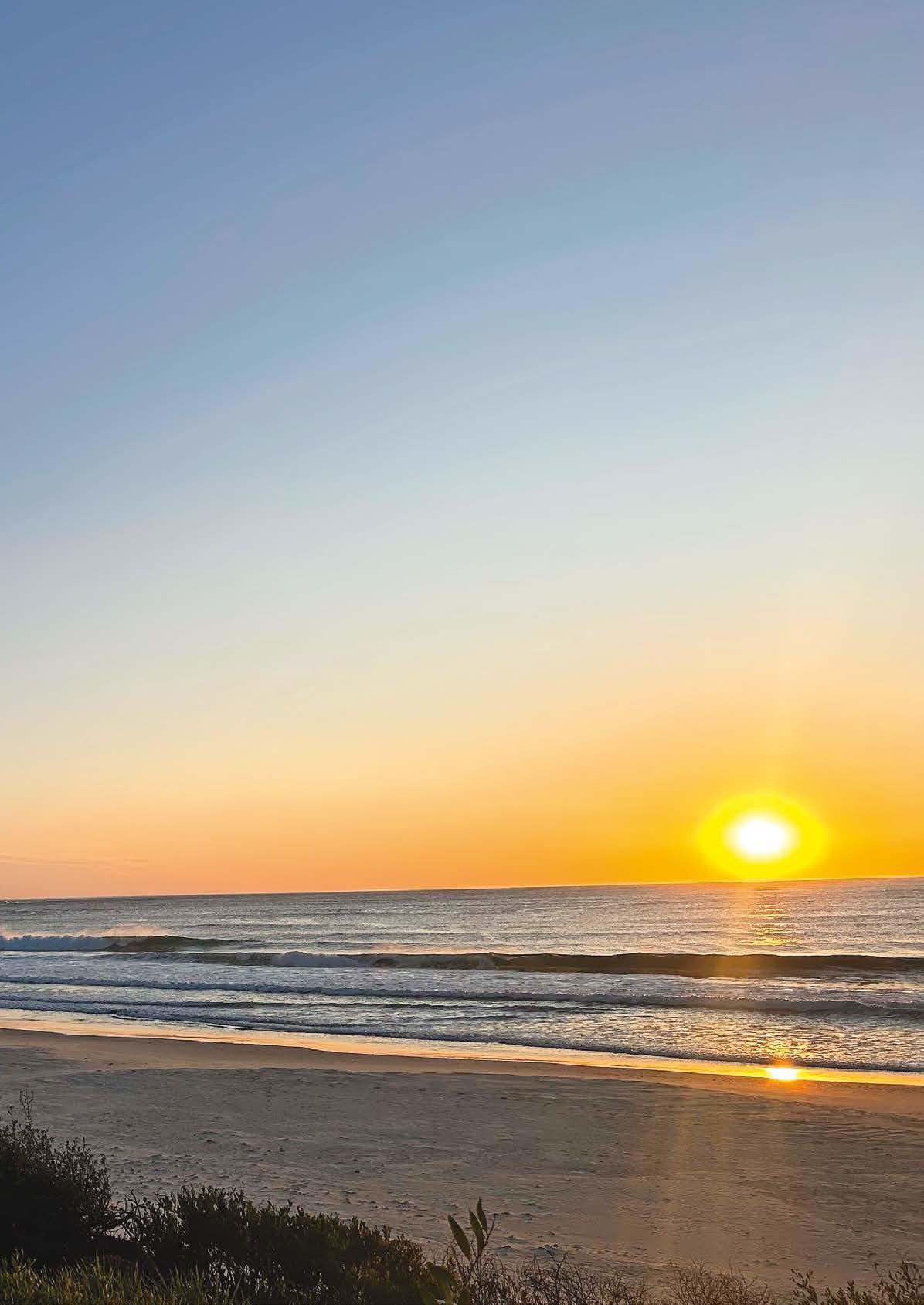
challenging, uncomfortable, or have elements of risk, and that produce no immediate sense of enjoyment or accomplishment. However, Type 3 fun often yields the most valuable lessons, experiences, or personal growth that are only recognised in retrospect. For example, getting caught in a rainstorm on a camping trip might not be enjoyable in the moment, but it could teach valuable lessons about preparation, adaptation, and resilience. These situations can often provide stories that connect us to our fellow fun-goers for years to come… You might hear ’remember that time we were on camp and we…’ discussed on a trip in the future.
Type 4 Fun – Really isn’t fun and may involve evacuations by helicopters. We never want to be reporting on that type of ‘fun’.
Overall, each type of fun, except for Type 4, has its place in our adventure programs. Type 1 fun provides immediate enjoyment and helps to build enthusiasm for the experience. Type 2 fun challenges them to push themselves and develop resilience, while Type 3 fun provides opportunities for reflection and personal growth. A well-designed outdoor education program should incorporate all three types of fun in a thoughtful and intentional way, to help young people develop a range of skills and attitudes that will serve them well in life.
Each and every student will react differently to the prospect of heading to camp. Your daughter might seek to avoid the potential discomfort, possibly pleading and begging with you not to send her, or she might head out the door, not looking back and barely saying goodbye. We urge you to remain steadfast and encourage her attendance, recognising the pivotal role it plays in her overall development. When your daughter returns from the adventure program, when you ask her about her experience ‘Did you have fun?’, be deliberate. Help her to grasp the significance of the three types of fun and guide her in thinking about and understanding how she has achieved personal growth throughout the process.
15 LUCIS AUTUMN/WINTER 2024
Exploringcontinuous connection
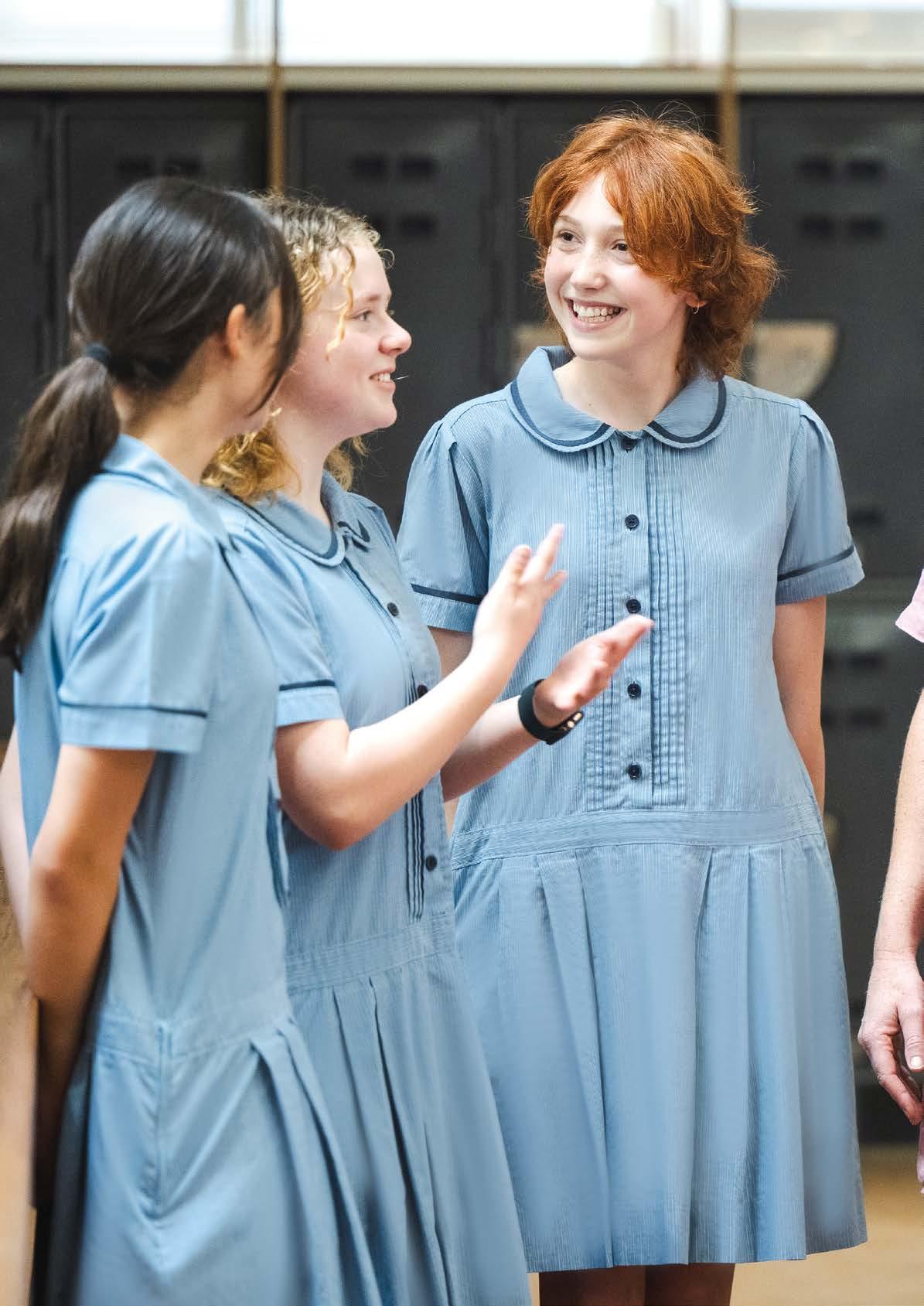
A strong sense of belonging in school is widely known to positively impact students' wellbeing. The NSW Centre for Education Statistics and Evaluation (CESE) recognise belonging as ‘the extent to which students feel personally accepted, respected, included and supported by others in the school social environment.’1
16 MLC SCHOOL
This feeling of acceptance and support from peers and educators can lead to various personal benefits, including improved mental health (helping to reduce anxiety and depression), a boost in academic engagement and performance, and a reduction in instances of bullying, misbehaviour and non-attendance.
‘Belonging is an essential part of creating an inclusive educational environment that supports students of all levels of need, as students at different stages require some level of support at both ends of a continuum'2 says Deputy Head of Senior School – Pastoral, Andrew Taylor.
In line with MLC School's Pastoral Care Framework, strategic vision, and School Values, the implementation of Circle Solutions for greater student wellbeing in 2024 aims to promote a positive, supportive atmosphere during Luminary which is more than just the practice of forming a circle in a room; the emphasis on student participation by their dedicated Luminaries fosters a healthy, supportive environment that enhances learning for all.

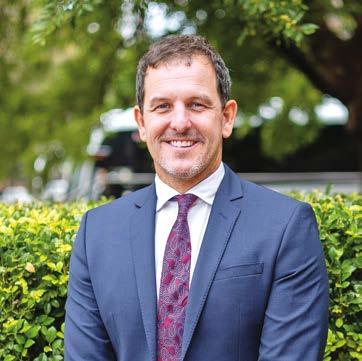
This evidence-informed pedagogical framework, based on positive psychology principles, focuses on building healthy relationships and creating a flourishing learning environment for students. Circle Solutions is guided by the ASPIRE principles of Agency, Safety, Positivity, Inclusion, Respect, and Equity. It is aimed at developing healthy relationships and an inclusive, flourishing learning environment for students.3
Opportunities to enhance a student’s socialemotional skills often lead to an increase in personal growth, the reshaping of learned attitudes, and therefore, resilience.
Professional development has been provided to Pastoral team staff, including Heads of Year, who have undergone training and implemented the pedagogy with noticeable positive impacts.
’Year 7 have enjoyed the Circle Solutions inclusive approach, as it has provided all students with the chance to share in a comfortable environment’ shares Emily Osborne, Head of Booralee House and a Year 7 Luminary.
‘The circles we form in Luminary time allows everyone to see each other, facilitating the chance for everyone to get to know the whole group. Circles allows everyone to have the chance to contribute their ideas’ – Lucia and Téa, Year 7 students.
The goal of implementing Circle Solutions is to strengthen the sense of community and connection among students throughout their educational journey. By fostering a supportive and inclusive environment, students can feel a greater sense of belonging and bond with their peers, creating a continuous circle of support throughout their School experience.
Andrew hopes ‘…that this new direction enables the cohorts to feel a continuous sense of connection and bond along their educational journey, like a circle.’
1
for Education Statistics and Evaluation. (2020). Student wellbeing: Literature review. NSW Department of Education, cese.nsw.gov.au
for Education Statistics and Evaluation (2020), Supporting students' sense of belonging – Every student is known, valued and cared for in our schools, NSW Department of Education, cese.nsw.gov.au 3
Developing positive relationships in schools. Positive Relationships: Evidence Based Practice Across the World.
Springer. LUCIS AUTUMN/WINTER 2024 17
Centre
2 Centre
Roffey, S. (2012).
Dordrecht, Netherlands:
THEN TEACHING TECH
Pioneering the integration of technology into education: continuing a tradition of innovation at MLC School.
Since its inception, MLC School has set new benchmarks in girls’ education, consistently embodying a pioneering ethos in all its pursuits.
MLC School has a number of significant ‘firsts’. It was the first school in Australia: to have a sports and gymnastics program for girls (1886); to build a kindergarten (1889); to hold an athletics carnival for girls (1906); to add physics to its vast science curriculum for girls (early 1920s); to have girls sit the physics exam in the Leaving Certificate (1924); and at the beginning of the computer age, MLC School again stood at
the forefront of educational transformation when it spearheaded the integration of technology into teaching practices. This forward-thinking approach not only revolutionised the learning experience, but again positioned the School as an education trailblazer.
This is the story of how computers were embraced and integrated into the learning environment at MLC School, marking the beginning of a new era in student education in Australia.

The Early Years: Exploration and Experimentation
Led by visionary educators and administrators, MLC School recognised the potential of technology to enhance student learning and foster innovation. With a pioneering spirit, the School embraced the challenges and opportunities that came with incorporating computers into the curriculum.
In 1978, as the digital age was dawning, MLC School took a bold step forward by purchasing computers and encouraging its students to engage with them. There was a sense of excitement as the first computers entered the School premises, and students and teachers together embarked on a journey of exploration and experimentation.
Within a year, students established a Computer Club, and the computer was eagerly used by the students. The Chess Club reported in Excelsior, 1979 that ‘Each Friday lunchtime a group of devoted chess-players gathered in the Maths room to try to beat the master, otherwise known as the School’s new computer. So far it has only been beaten once but we are still trying.’
18 MLC SCHOOL
Kent House class 5W taking part in the Computer Aided Learning Project, 1982
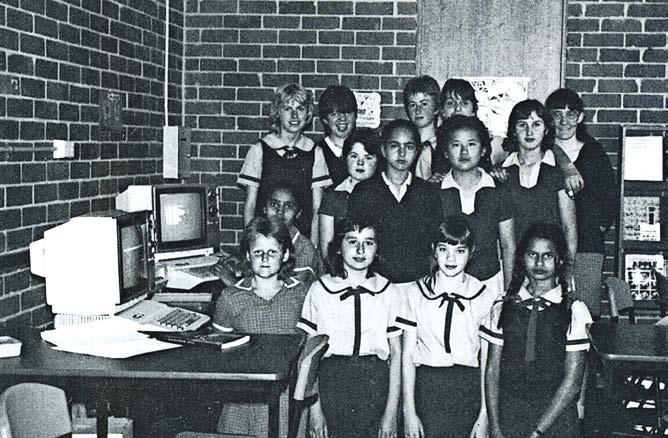

Innovation Takes Flight: From Experimentation to Practice
In 1982, MLC School embarked on a journey that would change the landscape of education in Australia forever.
On 4 April 1982, MLC School became the first school in Australia to integrate the computer into classroom learning. Each student in the 5W class in our primary school, Kent House, was assigned a Microbee1 desktop computer and the Computer Aided Learning Project commenced.
We are grateful to Jill Dixon (Ritchie, 1960) who clarified for us that it was Microbee computers that were used in the Computer Aided Learning Project. She says that her daughter, Mandy, ‘was privileged to be a part of this experiment’. Initially, the students were taught to touch-type and reached 100 words a minute. Once this skill was mastered, they completed some of the components of the Mathematics and English curriculum by working their way through specially prepared programs. By the next year, Jill tells us, these Year 6 students were answering Year 10 algebra questions. Not only was this classroom experiment a great success, it also enabled staff to clarify what should be the next step for technology at MLC School.
The Computer Aided Learning Project at MLC School was so novel and extraordinary at the time, that in August of 1982, the current affairs program 60 Minutes came to MLC School to record a segment on the use of computers in education. Reporter Ian Leslie said that ‘When computers find their way into classroom, as they have done at MLC School, there’s a revolution’, and that ‘this computer class was the first of its kind in Australia, and possibly the world.’
The 1983 publication 60 Minutes The Book included the MLC School ‘Computer Kids’ story. It stated: ‘The establishment of the computer class at MLC School highlights a whole new concept of learning, and, as far as Australia is concerned, signals the beginning of an educational revolution.’
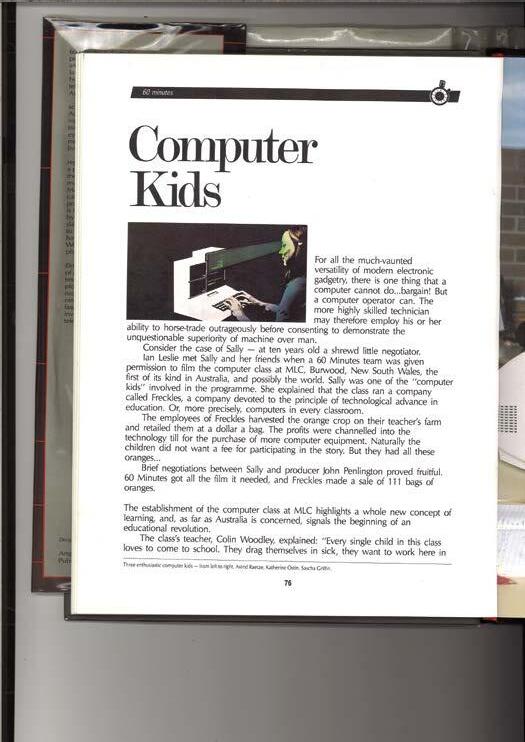
1 The Microbee computer was released by the Australian company Applied Technology in 1982. It was sold in kit form, and when assembled had the general appearance of a modern-day desktop PC. Its CPU (Central Processing Unit) was built into a typewriter keyboard unit, which was connected to a monochrome display monitor.
Computer Club, 1984
LUCIS AUTUMN/WINTER 2024 19
‘Computer Kids’ article in 60 Minutes The Book, 1983
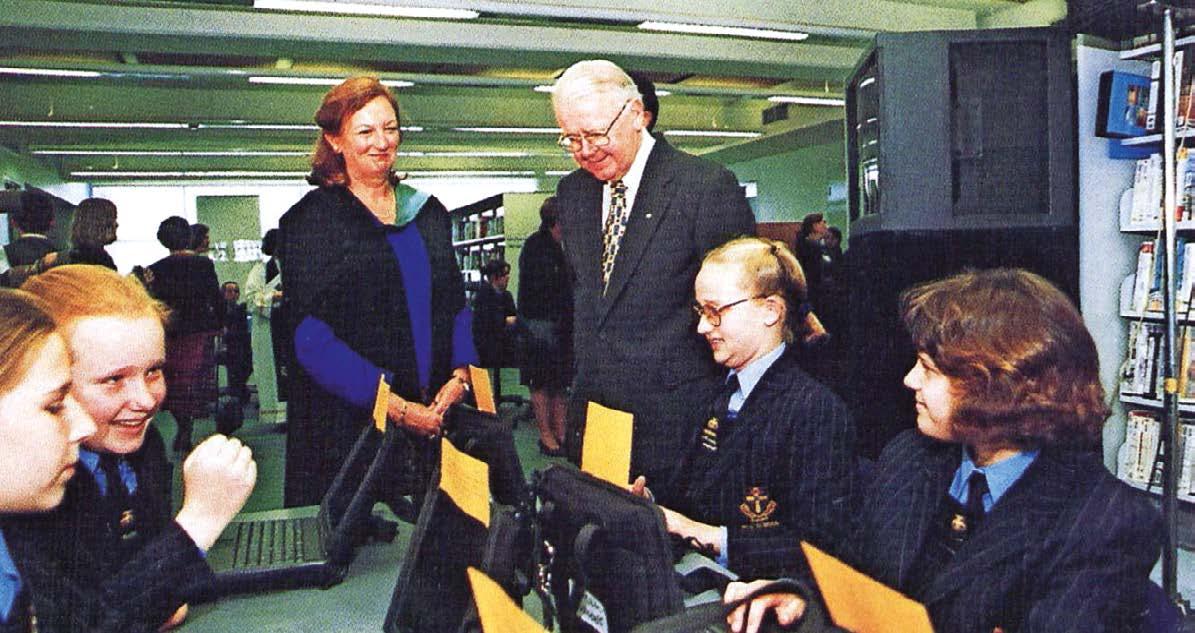
1990 Access and Equity
By the early 1990s, MLC School had invested heavily in hardware and software. It was one of the first institutions in Australia to introduce computer labs equipped with stateof-the-art hardware and software. Students were provided hands-on experience with programming languages and basic computing skills, laying the foundation for digital literacy in an era of technological evolution.
As the use of computers in education gained momentum, MLC School remained committed to ensuring access and equity for all students. Efforts were made to bridge the digital divide and provide equal learning opportunities. To this end, the School partnered with external technology-in-education groups, such as The NSW Computer Education Group, who used the MLC School computer labs to run workshops for teachers across Sydney.
1998 A Home for Technology
When the Independent Learning Centre (ILC) was opened in 1998, it became the physical centre for information technology and network communications for the whole School.
Sir William Dean, Governor-General of Australia, who officially opened the ILC on 2 September 1998, congratulated the School for its foresight and progressive planning with respect to the educational developments contained within the Centre.
The MLC School Principal at the time, Barbara Stone, said that the Independent Learning Centre was ‘the physical and figurative heart of our new direction as a School. It is both the symbol of, and the engine for, our response to the educational challenge and opportunities of the Information Age.’
Mrs Stone believed that ‘technology will be used to help develop curiosity, adaptability and creativity, to develop flexibility, effective interpersonal relationships and clear thinking, to help to develop respect, tolerance and teamwork, and an outlook which is global, rather than simply local.’
By building the ILC, MLC School committed itself to stepping boldly into the 21st century to ‘pursue not just basic, but multiple literacies: visual, digital, social, aesthetic, ethical and moral.’ ILC is now the home of Café 1886, the Wearne Library and The Ailsa Butcher Room.
In the dynamic landscape of education, embracing technology has become synonymous with progress and innovation. MLC School once again stood at the forefront of educational transformation; demonstrating that it is always prepared to embrace the challenge and opportunity of change.
Through its pioneering efforts in integrating technology into teaching practices, MLC School demonstrated a steadfast commitment to excellence and innovation in girls’ education. The School’s proactive approach to embracing technology not only enriched the learning experience but also prepared students to thrive in an increasingly digital world.
MLC School stands as a beacon of educational leadership, its legacy of innovation evident in its pioneering use of technology from the start of the computer age. By embracing technological advancements ahead of its time, the School continues to empower generations of young women to excel academically, professionally, and personally.
20 MLC SCHOOL
Barbara Stone, MLC School Principal, and Sir William Dean, Governor-General of Australia, at the opening of the Independent Learning Centre, 2 September 1998
START SNAPSHOT
Computers purchased and students are encouraged to engage with them.
Students establish a Computer Club. The Chess Club routinely tries to beat the computer.
Computer courses embedded in the high school curriculum. Kent House (primary school) Library has 10 Apple computers, nine disk-drives and one Microbee computer.
MLC School purchases Apple Macintosh SE desktop computers.


‘By using a modem, Year 10 made a direct connection with Trinity College’ … ‘the girls were excited by the prospects of long-distance communication.’ – Excelsior 1991. All year groups made use of the modem to talk to other schools through systems such as Keylink and Nexus. Apple Macintosh PowerBook 140 laptops are purchased for students.
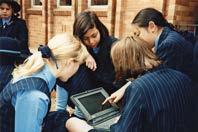

The Independent Learning Centre (ILC) opens and becomes the physical centre for the information technology and network communications for the whole School.
MLC School is the first school in Australia to integrate computers into the classroom with the ‘Computer Aided Learning Project’. 60 Minutes comes to the School to record a segment on this novel and extraordinary new learning experience.
The Wearne Library circulation system and catalogue is computerised.
The MLC School Computer Lab runs workshops for teachers from other schools on how to integrate technology into the classroom.
The Wearne Library has a store of laptop computers that it loans out on an overnight basis to Year 11 and Year 12, as well as girls taking computing studies in Year 10. Girls may also borrow a modem to use in conjunction with the laptop to communicate with the computer room at school. MLC School upgrades desktops to Apple Macintosh LC III and students begin using them in music classes.

iMac G3 and the ‘Clamshell’ iBook G3 take over MLC School in a riot of colours with flavour names: tangerine, grape, lime, strawberry, and blueberry.


1984 1979 1987
1985 1982 1978
1990 1993
1991 1999 1998
21 LUCIS AUTUMN/WINTER 2024
FUTURE TEACHING TECH
In the rapidly evolving landscape of education, emerging technologies continue to revolutionise the way we teach and learn here at MLC School. From gamification to Artificial Intelligence (AI) to mobile learning, these advancements are rapidly reshaping educational practices.
The integration of game elements into non-game contexts, otherwise known as ‘gamification’, has emerged as a powerful tool for enhancing student engagement and motivation.
‘Effective gamification encourages students to actively participate, set goals, and track their progress, fostering a sense of achievement and empowerment. Moreover, the use of games provides opportunities for collaborative learning, problem-solving, and critical thinking, so that essential skills can be developed in a fun and engaging environment’ shares Marianna Carlino, MLC School’s new Director of eLearning.
‘By incorporating elements such as points, badges, leaderboards and rewards into educational activities, educators can transform learning into an immersive and interactive experience.’
AI is another transformative technology that is revolutionising education.
DID YOU KNOW? AI-powered tutoring systems now exist, and can provide personalised learning experiences tailored to individual student needs.
HOW DOES THIS WORK? By analysing vast amounts of data, AI algorithms can identify students' strengths, weaknesses and learning styles, allowing educators to deliver targeted instruction and support.
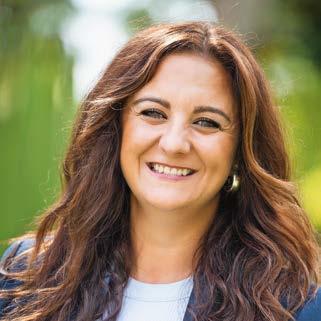
Through the widespread adoption of smartphones and tablets, learning resources are now accessible anytime, anywhere. Mobile learning platforms offer a wide range of educational content including videos, interactive simulations and quizzes, allowing students to learn at their own pace. They are no longer limited by their schedule!
Mobile apps are providing exciting global opportunities for collaborative learning and social interaction, enabling students to connect with peers and educators from around the world.
'I am proud of such a rich history that embraced technology in such an impressive fashion. While I am only new to MLC School, I am very pleased to join this future-focused community.'
shared Marianna Carlino, MLC School’s new Director of eLearning.
As MLC School continues to explore the boundless potential of technology in education, it is essential to ensure that these tools are used thoughtfully and ethically to maximise their benefits for girls’ education. With the right approach, emerging technologies have the power to transform education and empower students to succeed in an increasingly complex and interconnected world.
To investigate these emerging trends further, please use your device to scan the QR code here where you will be able to access additional resources to facilitate your very own discovery phase. There’s even some TEDx talks, enjoy!
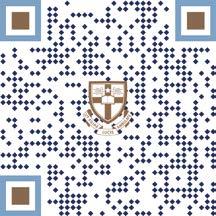
22 MLC SCHOOL
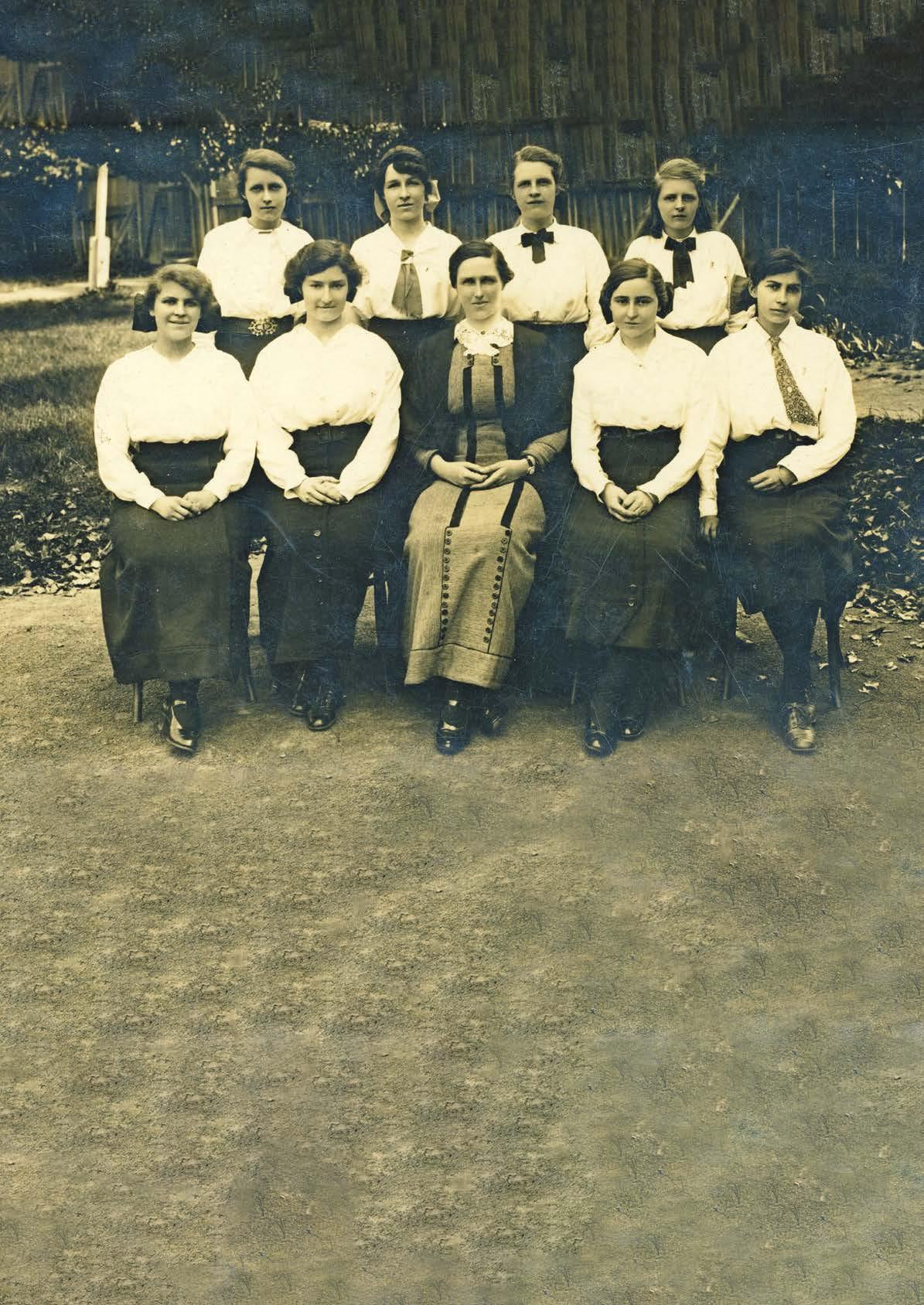
TAKE THE LEAD
110 YEARS OF GIRLS' LEADERSHIP DEVELOPMENT
For over 138 years, MLC School has been a beacon of excellence, nurturing leaders who are adaptive, compassionate, courageous, and who are able to embrace new challenges and opportunities. Since its inception in 1886, MLC School has been guided by a spirit of innovation and a commitment to empowering its students to lead with integrity and purpose.
w 23 LUCIS AUTUMN/WINTER 2024
The first eight official student leaders at MLC School, photographed with Headmistress and Old Girl (Class of 1896), Mabel Sutton (Excelsior, November 1914)
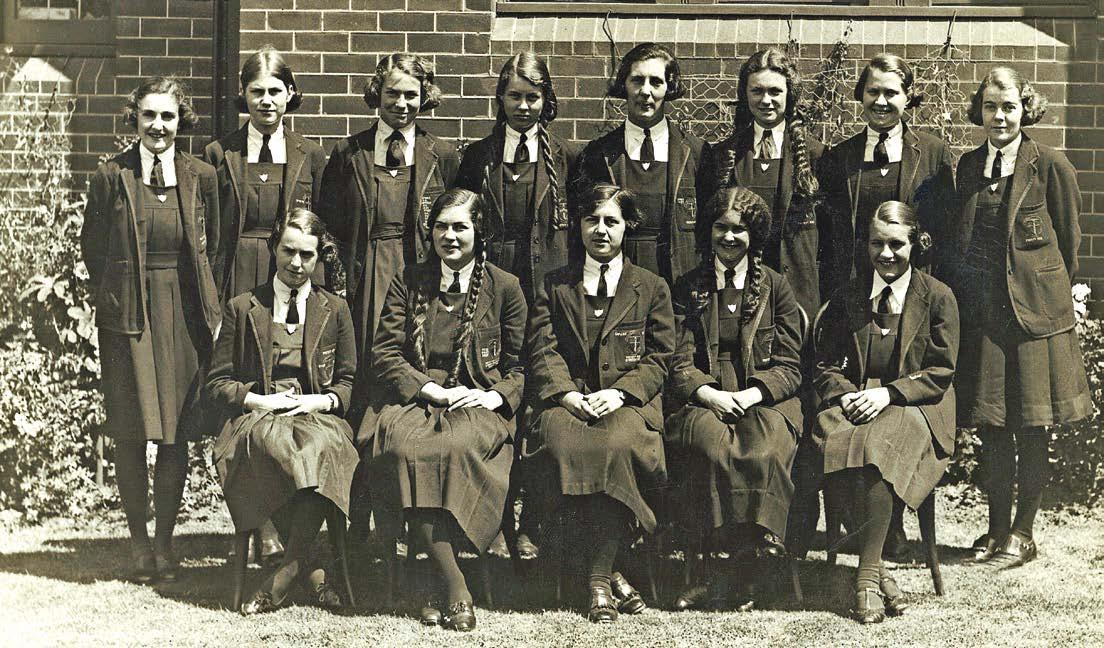
In 2024, we commemorate 110 years of student leadership at MLC School. We reflect on the history of generations of dedicated individual students who have left an indelible mark on our School and in society.
STUDENT LEADERSHIP COMMENCES
The official system of student leadership commenced at MLC School in 1914. Prior to this, when the School’s student population was small, the senior students (by virtue of their seniority) had informal rights, responsibilities, and the authority to reprimand and correct ‘unseemly’ behaviour among the student population. They were there to set the tone for student conduct and attitudes.
The larger enrolments of the early 1910s necessitated a formalisation of this system, therefore in 1914 a select group of senior girls were appointed as monitors of discipline and standards of behaviour within the School. This new student leadership system was based on the model of Prefectship at private girls’ schools in England.
The 50 year history of MLC School, Jubilee, published in 1936, reflected on the benefits to the School that the introduction of an official student leadership structure had provided. It stated that the student leadership system is ’one which has proved of incalculable value, both to the girls in office and to those whom they serve.’
THE FIRST INDUCTION CEREMONY OF STUDENT LEADERS AT MLC SCHOOL
For the first 19 years of the student leadership system at MLC School, girls were appointed by the Principal and Headmistress. The appointments were announced at an Assembly and published in Excelsior
It was not until 1933 that the decision was made to solemnise the appointment of student leaders with an Induction Ceremony.
On 30 March 1933, the first Induction Ceremony of the senior student leadership was conducted in Potts Hall. It was the first of what was to become an annual ceremony of considerable significance and solemnity.
Each of the student leaders was presented with a badge of office and they solemnly and publicly pledged to ’maintain the best traditions of the School, to encourage others to do the same, and to exercise my authority with discretion and with justice’.
1933 School Prefects
24 MLC SCHOOL
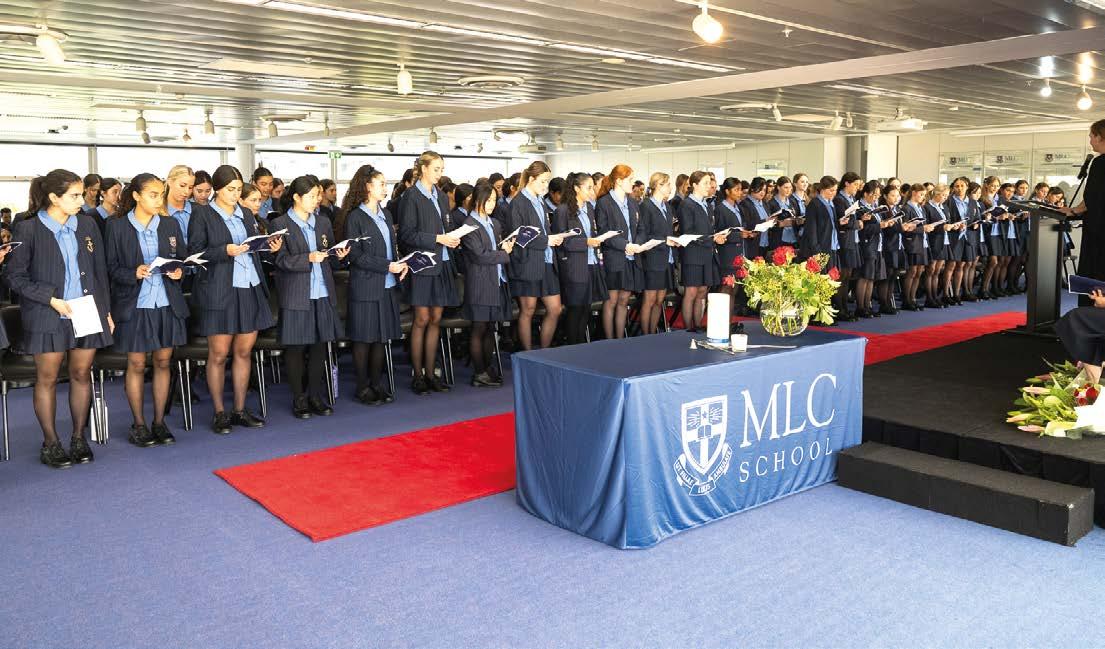

RED ROSES TRADITION
The bowl of red roses that decorates the official table at Induction Ceremonies has been a tradition for many decades. In Excelsior 1957, student (and daughter of 1960–1964 MLC School Principal, Winston O’Reilly) Elizabeth O’Reilly (1957) explained the meaning behind the tradition: ‘On the platform, a beautiful bowl of red roses symbolised the beauty of the service that followed.’
In the early days of the Induction Ceremonies, the bowl was filled with flowers by the Year 11 (then Fourth Year) girls ’from whom will be chosen the Prefects of the following year. So these red roses bear a message from those who have passed onwards into Prefectship and from those who are to come.’
Throughout the decades, students at MLC School have embraced the call to leadership, spearheading initiatives that have transformed our campus and community. From advocating for social justice to championing environmental sustainability, our student leaders have fearlessly confronted the challenges of their time, leaving behind a tradition of progress and positive change.
At the heart of MLC School’s legacy of student leadership lies a sense of community and belonging that unites the spirit of Old Girls, current students, and the ‘long generations’ who will come after us.
‘On the platform, a beautiful bowl of red roses symbolised the beauty of the service that followed.’
25 LUCIS AUTUMN/WINTER 2024
Students continue the tradition at the 2024 Leadership Indiuction Ceremony
2020 School Prefects
MLC School has been part of the Round Square global community since 2004. Over the past year, MLC School has adapted the leadership program using Round Square Discoveries to support the development of leadership skills in our Year 5 students.
JUNIOR SCHOOL LEADERSHIP TODAY
In the Junior School, all Year 5 girls are part of a leadership portfolio. There is a Junior School Captain and Vice-Captain, Junior School Student Council (JSSC) representatives, and House Captains and Monitors in the following areas: Art, Environment, Library, Music, Service, Sport and Technology. The House Captains lead their Houses in various challenges, earning House points. The Monitors organise activities that support and build community.
MLC School has been part of the Round Square global community since 2004. Over the past year, MLC School has adapted the leadership program using Round Square Discoveries to support the development of leadership skills in our Year 5 students. In April 2022, Round Square presented its new suite of resources for Junior Schools – the Heroes of Discovery.
Joanne Sharpe, Deputy Head of Junior School – Wellbeing shares how and why MLC School took the opportunity to be part of the piloting of these new resources, ‘Enthusiastic staff from all over the world attended a workshop where we explored and played with the Round Square resources and wrote some activities to add to the suite. The goal is to promote the 6 IDEALS and 12 DISCOVERIES in our respective schools.
The Junior School staff focus has been to develop a Leadership Program from Term 3 in Year 4 which continues throughout Year 5.
The aim is to support the girls to discern the best leadership portfolio for themselves, using 'Self-Aware Simba' to help. An understanding of the expectations of leadership in the Junior School will also be explored with the help of 'Responsible Rami'.
'Teamwork Tama' and 'Communication Cara' also assist the Year 5 girls to develop these vital skills for their leadership roles. 'Problem Solving Papri' will also support our leaders to be creative and think of ways to enhance the Junior School environment.’
Lisa Moloney (Principal of MLC School and Round Square Regional Trustee for Australasia and East Asia), Xavier Maling (MLC School Round Square Coordinator) and Elizabeth Wilkie (2023 Round Square Captain) have played an important role in demonstrating leadership internally through speaking with the 2023 Year 5 cohort. Round Square ultimately allows the building of cross-school connections, which is wonderful for students to witness and be part of, gaining meaningful insight into the wider opportunities Round Square enables.
Staff in the Junior School have also had the opportunity to delve more deeply into the world of Round Square and develop a deeper understanding of the philosophy of the organisation and how MLC School embraces the IDEALS and DISCOVERIES.
Round Square is also alive and well within the MLC School adventures and co-curricular programs, with enthusiasm growing. For the Junior School, Round Square leadership has certainly been an ’ideal discovery’.
26 MLC SCHOOL
The Junior School staff focus has been to develop a Leadership Program from Term 3 in Year 4 which continues throughout Year 5.

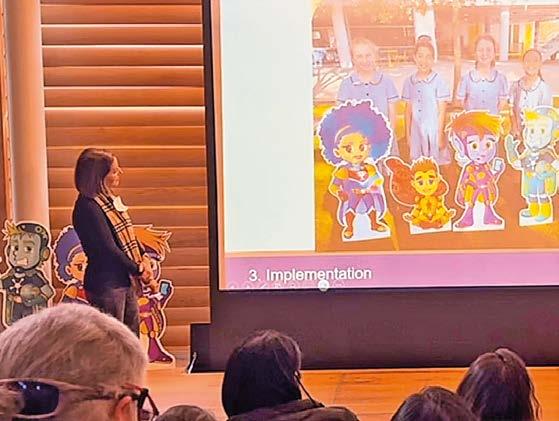
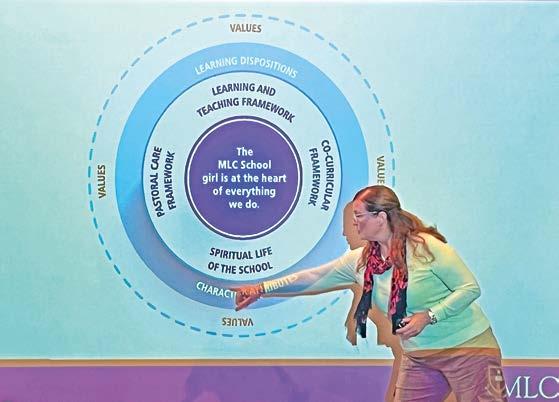
27 LUCIS AUTUMN/WINTER 2024
Staff presenting on Junior School Leadership at the University of Oxford
A NEW ERA OF SENIOR SCHOOL LEADERSHIP
Round Square has also been a vibrant part of the Senior School, which celebrates Round Square Week at the end of each Term 2, and a number of Year 10 and Year 11 students attend the Round Square Conference held internationally each year, with the last one held in Nairobi, Kenya.
Providing students with opportunities to develop their leadership skills has been an essential hallmark of the MLC School educational experience. Afterall, girls need to see leaders and experience some level of leadership in order to become leaders, develop enhanced self-esteem, school commitment, communication and teamwork skills.1 Research confirms that when students have a voice and are connected to their community and school, their sense of belonging and connectedness are enhanced. When support and structure around leadership are provided, students are enabled to make serious and important decisions, valuable contributions, and demonstrate their skills, expertise and knowledge to meet the needs of their community.
In 2023, an extensive review of the Senior School leadership offering was undertaken to widely share the benefits, in line with the School’s Mission, ‘...to be agents of change in their own lives and the lives of others.’ Term 2 was a valuable period of consultation; practising and modelling very important listening skills to the girls who participated.
The voluntary Coffee with the Principal session, focus groups with parents/carers, and a range of feedback from 25 staff and 70 students (including the 2023 Captain team) provided a clearer understanding of structural formation wants and needs.
This enthusiasm painted a constructive picture of where to begin, in light of collective concerns from the community survey’s data-driven insights, mainly to do with an appetite for portfolio change and improvements to the election process. Positively, there were many parts of the historical structure that the community were keen to keep, including the portfolio captains and school captains.
Ideas offered by participants formed a mind map for how we best utilise this 21st century opportunity to expand the roles to explore more of the girls’ passions and best serve subsets of the School community. This comprehensive review progressed into a proposal to unlock further leadership potential in the senior girls.
The new fit-for-purpose Senior School Leadership framework is made up of three distinct groups:
• The Senior Leadership team (10 positions)
• Captains (24 positions)
• Sub-captains (multiple positions)

THE NEW SENIOR SCHOOL School Vice-Captain – Year 6 to Year 9 SRC and Service Sport Captain Music Captain Sub-captains and committee Sub-captains and committee
Scholar Captain
The Arts Captain
Literary Captain Mind Challenge Captain STEM Captain Crew Captain
Dance Captain Design Captain Drama Captain Visual Arts Captain
Sub-captains and committee Sub-captains and committee Abbeythorpe Vice-Captain Booralee Vice-Captain Churunga Vice-Captain
Abbeythorpe Captain Booralee Captain Churunga Captain
28 MLC SCHOOL
'I’ve learned that people will forget what you said, people will forget what you did, but people will never forget how you made them feel.’
– Maya Angelou
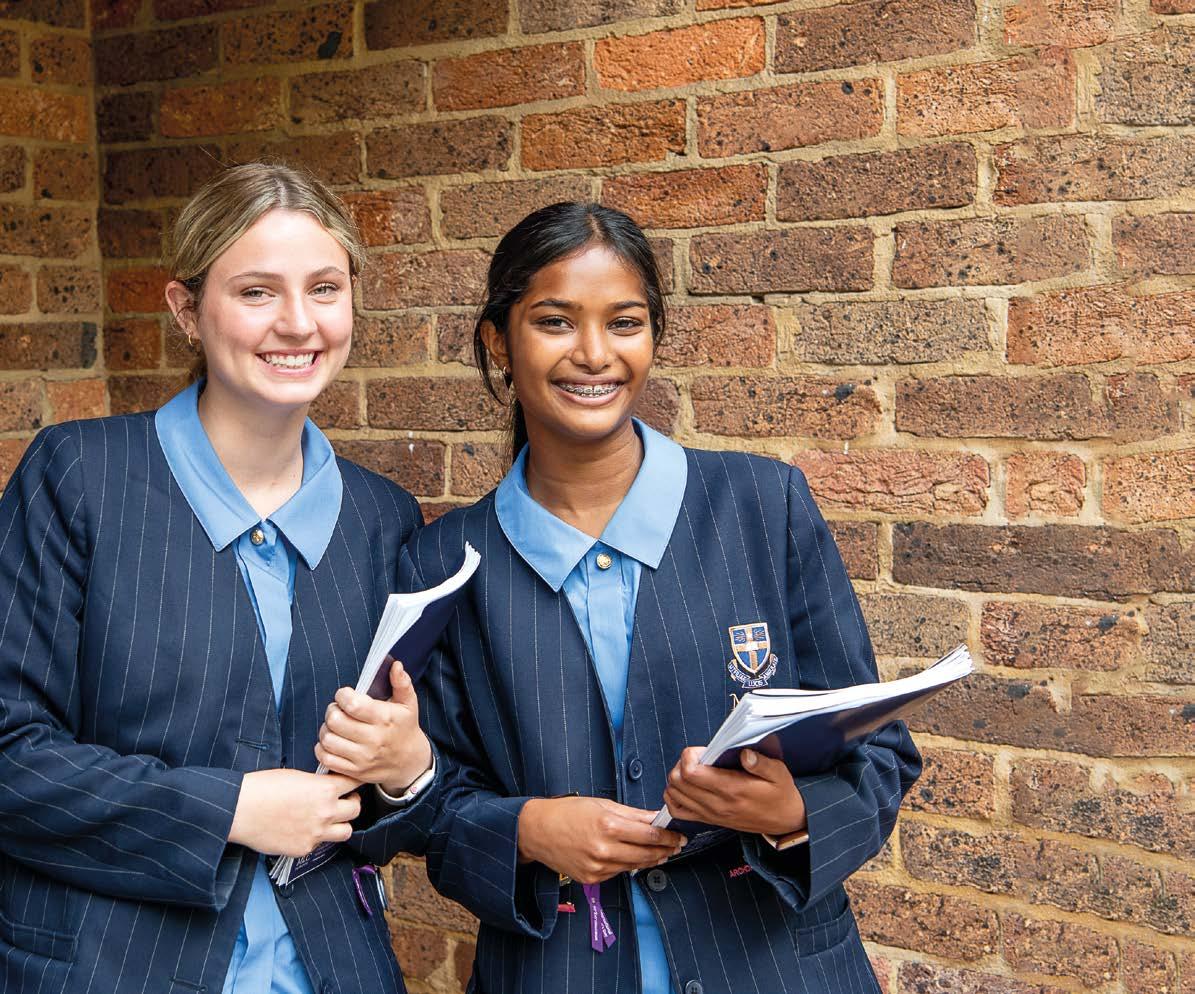
LEADERSHIP FRAMEWORK
Captain
Vice-Captain – Year 10 to Year 12 SRC and Service
Co-curricular Captain
Sub-captains and
Adventure Captain Debating Captain
committee
School Spirit Captain Community and Round Square Captain
Leawarra Captain Lester Captain Mooramoora Captain Prescott Captain Sutton Captain Wade Captain Whitley Captain Chapel Captain Diversity Captain Environment Captain Wellbeing Captain
Leawarra Vice-Captain Lester Vice-Captain Mooramoora Vice-Captain Prescott Vice-Captain Sutton Vice-Captain Wade Vice-Captain Whitley Vice-Captain Sub-captains and committee
29 LUCIS AUTUMN/WINTER 2024

Changes made to the 2024 nomination, voting, interview and election procedures included extending the portfolios for Captains to reflect the rich range of opportunities available, providing benefits to all those who put themselves forward for election to serve the MLC School community. A resulting comment from a Year 11 student following the announcements are an encouraging sign of the first steps, which include improving access to leadership, ‘I wouldn’t have applied to be a captain [previously] as I didn’t think that there could be a position for me. Now I can see a few positions that I would like to apply for.’
New additions reflective of the improved relevancy to the next generation of students include roles such as the Adventure Captain, STEM Captain and Wellbeing Captain, just to name a few.
All captains will have an opportunity to develop their leadership capabilities through training alongside a supportive team of Senior School staff. The Senior Leadership team have their own respective teams to work with on projects and initiatives within MLC School. These teams will also involve committees of students from Year 6 to Year 11, providing an extension and transition period for those girls from the Junior School. These committees will continue to build and strengthen.
‘I often say to students that we are all leaders, with, or without badges...' says Joanna Graffen, Head of Senior School.
‘I often say to students that we are all leaders, with, or without badges. The MLC School Executive Team are committed to ensuring that all students, regardless of their strengths or weaknesses, have the chance to develop leadership skills for positive impact, now and into the future’ says Joanna Graffen, Head of Senior School.
Learning to guide others is a vital life skill, whether you are young or old, a role model figure or not, ‘We are pleased to have had the opportunity to reflected on the views of leadership in our community. The young women who have taken the lead in areas that they are truly passionate about have been most impressive and we are looking forward to seeing the development and improvement of the program.’
30 MLC SCHOOL

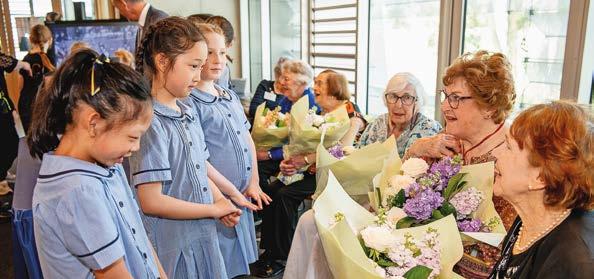
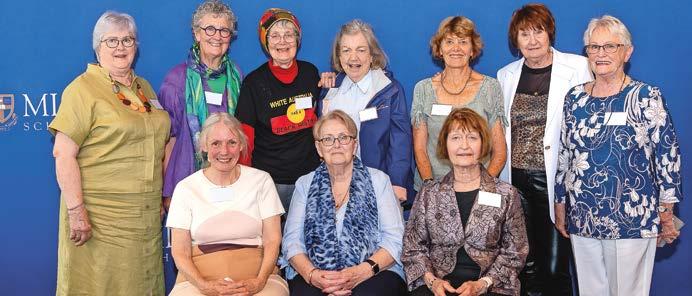
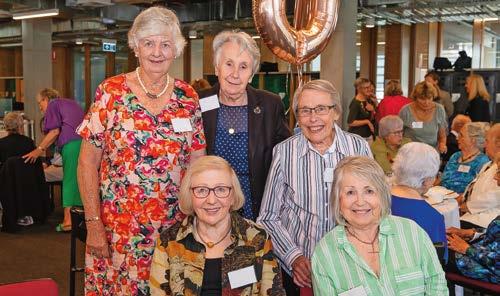
Annual Sapphires’ Luncheon
Sapphires are MLC School’s most treasured Old Girls; those who graduated at least 51 years ago. Late last year, our Sapphires raised their voices at a dedicated Chapel Service and then joined together for a joyous lunch.
The two oldest Sapphires, Shirley Baker (Jones, 1948) and Pamela Wilster (Lee, 1948) cut the celebratory cake, ably assisted by the youngest daughters and granddaughters of our Old Girls.
Several photos from past school days were shared; a bold reminder of the significant connections our Old Girls continue to have with each other, even decades after leaving school.
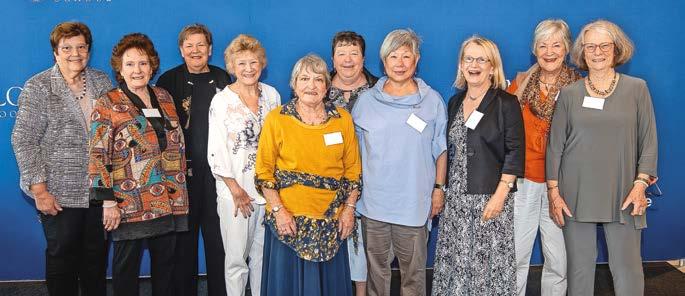
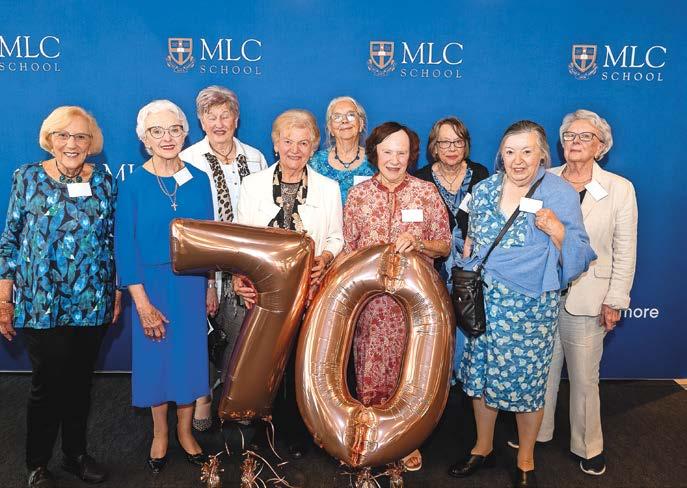
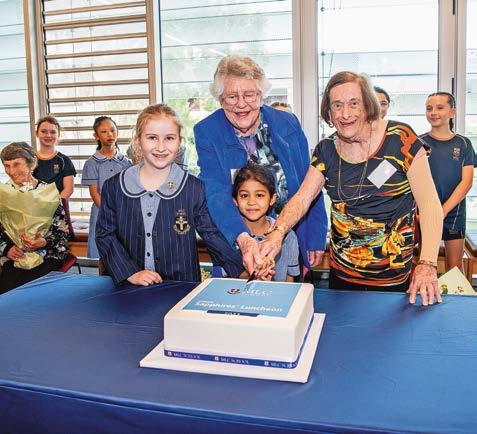
SAVE THE DATE TUESDAY 22 OCT 2024 SAPPHIRES CHAPEL SERVICE AND LUNCH
31 LUCIS AUTUMN/WINTER 2024
Common Sense Strategies for Raising Girls

Dr Justin Coulson is the co-host and parenting expert on Channel 9's Parental Guidance, the founder of happyfamilies. com.au, and one of Australia’s most trusted parenting experts. Justin was the Term 1 guest speaker as part of the Parent Forum series sponsored by the School’s Parents and Friends Association (P&F).
As a father of six girls, he’s often asked for strategies to raise happy girls who are responsible and strong. Below are five of Justin’s top tips, relevant for parenting girls of any age:
1
Help her feel connected
When you connect with your daughter, you help her to feel seen, heard and valued, which are vital psychological needs. You connect by helping her feel your delight when she walks into the room. You connect by stopping what you’re doing and really listening when she speaks to you, and by ensuring she feels truly worthy and loved.
2
Help her feel she’s enough
On Father’s Day 2020, a 12 year old girl completed a quiz about her dad, answering questions such as ‘What’s your favourite thing to do with your dad?’, ‘What’s your favourite memory of your dad? And ‘What’s your favourite song to sing with your dad?’
One question asked her to complete a sentence: ‘I know my dad loves me because...’. His daughter wrote, ‘Because I’m me, and that’s all he wants me to be.’ Help your daughter feel she’s enough because she is.
3
Help her navigate friendships with grace
Research highlights that girls have more friendship challenges and experience more relational issues than boys. Girls are more socially oriented. They fight more with words and emotions than boys, who tend to fight with their bodies. Girls also ruminate more than boys. While fitting in is important for all children, girls use social exclusion and relational aggression in unique ways that can really hurt.
32 MLC SCHOOL
If your daughter struggles with friendship issues, there are no easy answers. However, your attitude will make a huge difference. Gentle conversations that emphasise her value and worth, plus reinforcing your relationship, are both important when girls struggle. At some stage, ask your daughter to reflect on these questions, ‘Do I like myself when I’m around those people?’ and ‘Do I feel like I’m being true to who I am when I’m around those people?’
4
Help her love her body
Most girls want to feel beautiful. It’s a parent’s job to let them know they are –always. And that beauty comes from the inside. Never talk negatively about your daughter’s body. Body shaming doesn’t encourage healthier behaviour. It just makes girls want to disappear into a black hole of unworthiness. Remind her that it matters more what she can do with her body, rather than how it looks.
5 Remember to let go
A parent’s job is to prepare them for life without them. You’re playing the long game, so the quality of your relationship really matters. Raising them to let them go is hard. But that’s just how it should be.

You can hear more sage strategies from Justin via the leading parenting and family podcast, Dr Justin Coulson's Happy Families.
33 LUCIS AUTUMN/WINTER 2024
VALE
It is with great sadness that we learn of the passing of members from our community.
Vale to all those in the MLC School community who have gone from our lives. As daughters of the light, they are in our thoughts and prayers.

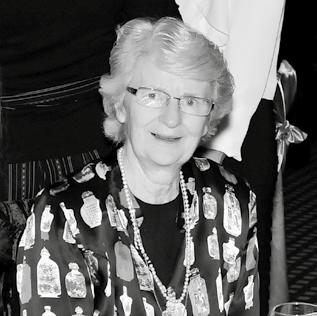
Lynette Foster (Slatyer, 1952)
Lynette’s sister, Kathryn Cowley (Slatyer, 1964) has sent us this tribute to her beloved sister below who passed away in Hobart on 14 December 2023.
Lyn graduated as a physiotherapist from The University of Sydney in 1957 and commenced her career in NSW. She later worked in Hobart and in Quebec, Canada.
After returning to Hobart in 1966, Lyn married Graeme and had three children. She continued to work in Hobart until 1997 at which point she and Graeme moved to Koonya on the Tasman Peninsular, southeast of Hobart. She continued to practice as a physiotherapist part-time at the Nubeena Community Centre on the Peninsula.
At Lyn’s memorial gathering, one of her friends and former colleague stated that Lyn was not only a skilled and knowledgeable physiotherapist, but a very humane and compassionate friend and workmate, especially to new graduates from interstate. Lyn’s family, friends and colleagues agreed she was a dedicated physiotherapist, mentor, listener, confidante and friend, who taught us all so much.
Lyn is the loved wife of Graeme and adored mother of David, Kathryn and Suzie; mother-inlaw of Selina, John and Stephen; grandmother of William, Henry, Rory and Elsa; and elder sister of Stuart (dec) Harvey and Kathryn Cowley (Slatyer, 1964).
Dr Sylvia Walton AO (Collis, 1957)
MLC School Old Girl and eminent educator, Dr Sylvia Walton AO (Collis, 1957) passed away in Melbourne on 27 January 2024.
Sylvia’s life was one of unwavering dedication to education. Her esteemed career spanned several decades and was marked by dedication and a commitment to excellence that significantly contributed to the growth and development of educational institutions in Melbourne and beyond.
Sylvia championed curriculum enhancements, fostered research initiatives, and advocated for inclusivity. She set a high standard for educational institutions, challenging them to continually innovate and evolve.
In addition to her distinguished career, Sylvia will be remembered for her compassion and genuine concern for the wellbeing of students and colleagues.
Sylvia’s leadership, dedication, and compassion will continue to inspire generations of students and educators. We celebrate the lasting impact Sylvia leaves on education in Australia.
34 MLC SCHOOL
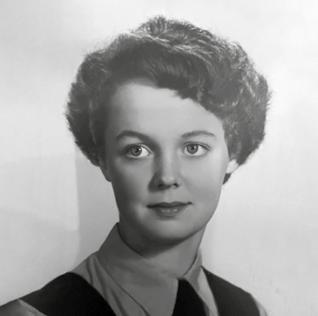
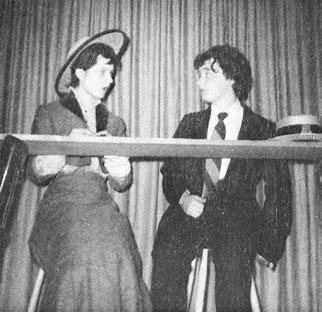
Neva Malek (Parsons, 1960)
Kerri Levison (Bunyan, 1963) has written with the sad news that Neva Malek (Parsons, 1960) died on 16 February 2024.
Neva was a Boarder at MLC School and was the Head House Prefect in her final year. She was also a Senior Prefect and the Captain of the Hockey Team.
Heather McGuinn (Wright, 1960) sent us reminiscences on her friendship with Neva:
I met Neva in 1956 when we started the first year of High School in the same class at MLC School. We travelled the same scholastic path until completing our Leaving Certificate in 1960. Neva was a diligent student and was elected to be a Prefect and the Head House Prefect; she was greatly admired and respected by her peers and staff.
She was a Boarder and I was a Day Girl living in Croydon. On some of her free weekends, she stayed at our place and fitted in very easily. We shared a bedroom and chatted well into the night with lots of muffled giggles. Neva was full of fun and enjoyed life.
In later years we went our separate ways with careers and families but still kept in touch with cards, etc. Neva was always the same kindhearted, reliable friend who had others’ best interests at heart. She will always have a special place in my heart. RIP Neva.
Janet Robbins (Stuckey, 1962)
Jan’s husband, Mike, and her 1962 MLC School friends, Margaret Robertson and Elizabeth Seale, have sent us the sad news that Jan Robbins (Stuckey, 1962) died on 25 July 2023.
In 2007, Jan was diagnosed with Parkinson’s disease, but she didn’t let that slow her down. She continued to pursue her favourite activities including ice skating and bushwalking, while also maintaining her active involvement in the ACT branch of the Australian Native Plant Society – for some time as President.
After completing her Leaving Certificate at MLC School, Jan studied Agricultural Science at the University of Sydney and went on to complete a PhD in plant cytogenetics (specifically, the inheritance of glaucousness in wheat) at The University of New South Wales (UNSW).
Jan went on to lecture at UNSW, The University of Canberra, and The Australian National University, where she also worked as an academic skills advisor.
From the 1970s, Jan and Michael lived in the ACT at the architecturally significant Urambi Village. Their connection to Urambi Village started when they joined the Urambi housing cooperative and became involved in establishing the goals for the Village. They went on to help design and plant the Village’s extensive native bush gardens, of which Janet was particularly proud.
Get in touch
We value being able to recognise Old Girls who are no longer with us. To get in touch, please contact Barbara Hoffman, MLC School Archivist, on +61 2 8741 3214, or email bhoffman@mlcsyd.nsw.edu.au.
Scan to read about the lives of our late Old Girls online
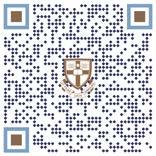
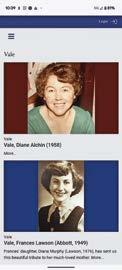
35 LUCIS AUTUMN/WINTER 2024
Jan Stuckey, as Emily, and Beverley Burgmann, as George in a scene from Our Town in 1962
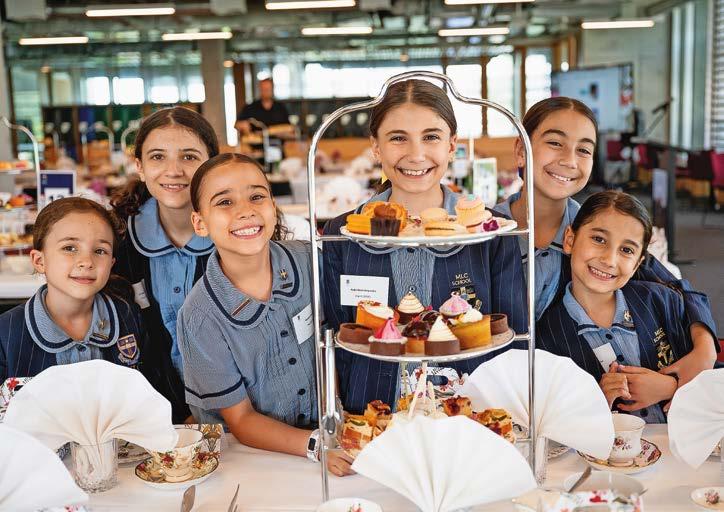
HIGH TEA CELEBRATES FAMILY TIES
Longstanding connections to MLC School were celebrated at the annual Intergenerational High Tea on Sunday 3 March.
Many of our youngest students spent the afternoon enjoying petit fours with their family members including sisters, aunts, mothers, grandmothers and even great grandmothers!
Old Girls enjoyed sharing quality time together, reconnecting with their own past networks and revisiting the modern school grounds.

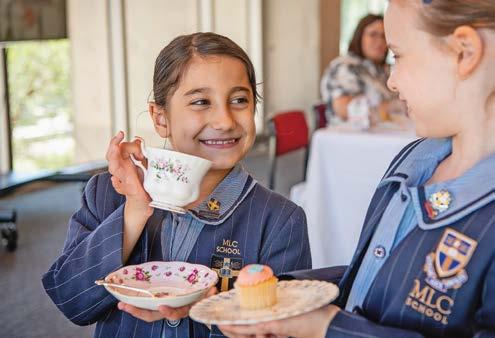
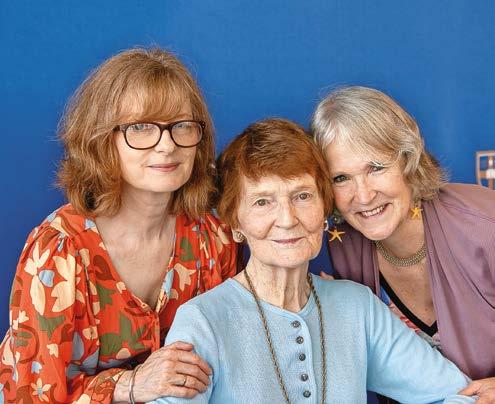

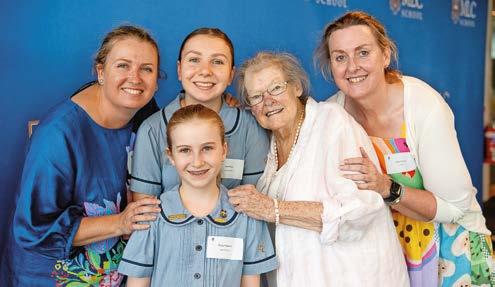
36 MLC SCHOOL
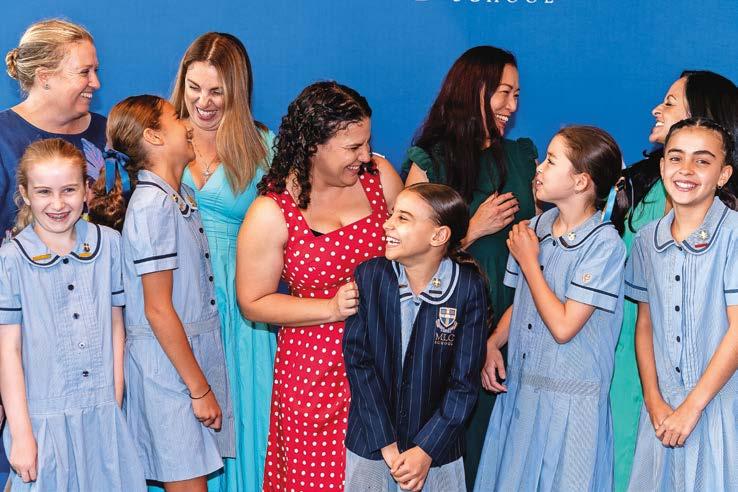




37 LUCIS AUTUMN/WINTER 2024
IMAGINE. INSPIRE. INCLUDE.
The annual International Women’s Day Breakfast Forum focused on how the MLC School community can #InspireInclusion beyond the classroom.
MLC School Old Girl, Alison Mirams (1991) spoke of her experience navigating the construction industry and inviting more women to the table. Current parent Gaya Shrikumar, Head of Human Resources at Pfizer also played a pivotal panel role, sharing her insights about the world of STEM from a global perspective.
Vice-Captain – Year 10 to Year 12, Georgie Roediger was a confident moderator for the event, supported by her fellow student panellists (left to right onstage): Diversity Captain, Divya Sharma, Community and Round Square Captain, Sarah Furlan and Wellbeing Captain, Lily Hatton.
38 MLC SCHOOL
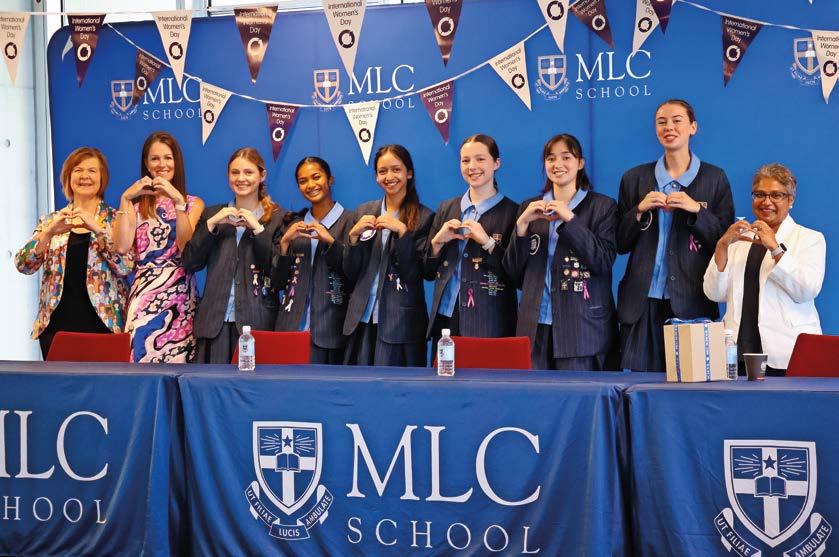
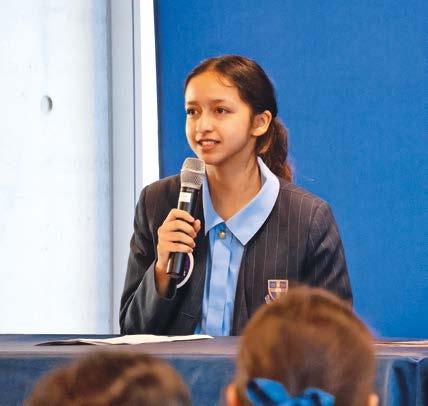

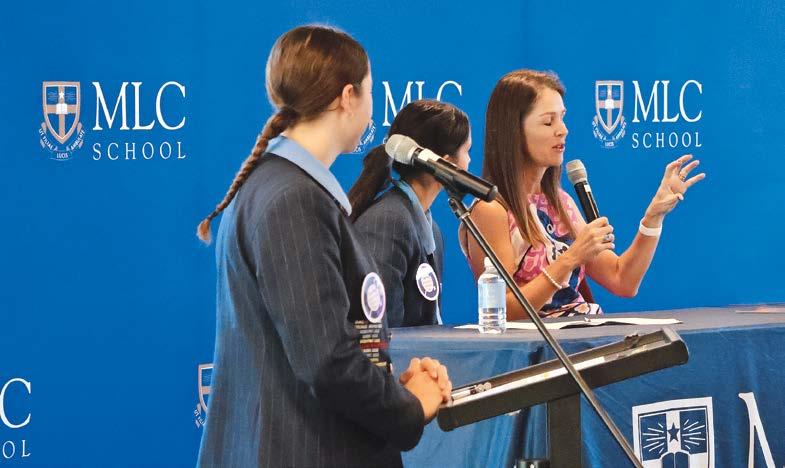
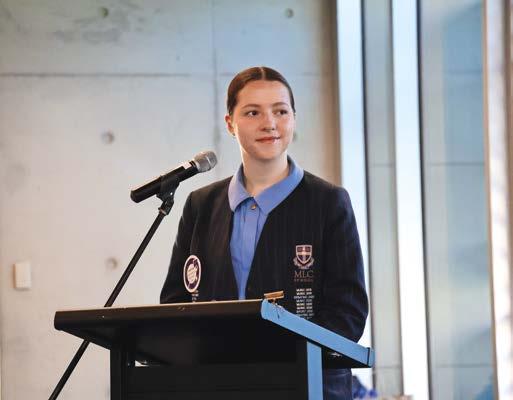
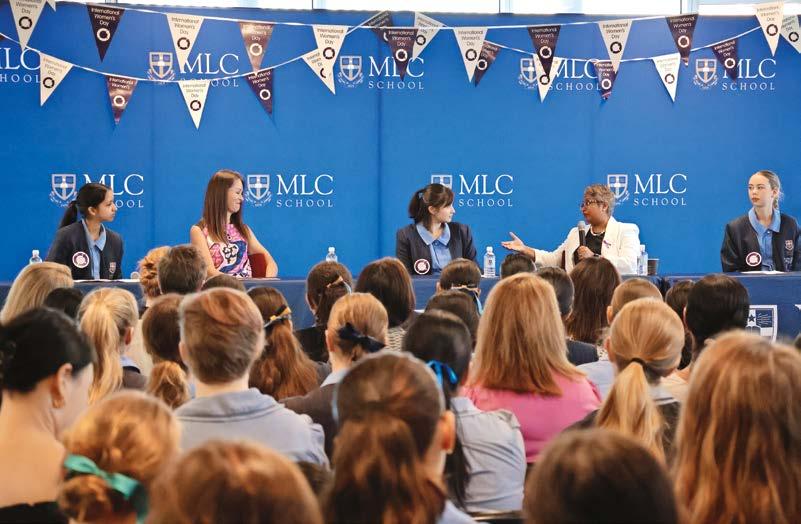
39 LUCIS AUTUMN/WINTER 2024
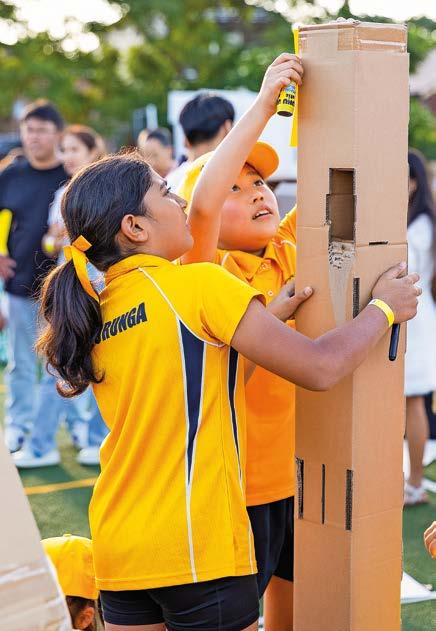
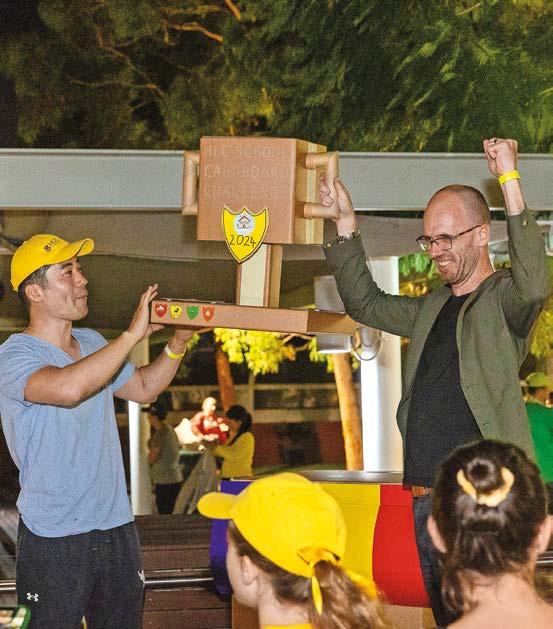

Creative Crafters
The 2024 Cardboard Challenge moved to the start of the year and brought together the MLC Junior School community in March. A big thank you to all those who generously gathered cardboard and organised cardboard donations for several weeks to allow the reuse of this fantastic material.
This year’s theme, Daring Dream Houses, called for mini designers and mini architects from Pre-Kindergarten to Year 6. Together with all the family, everyone battled it out for the coveted Cardboard Challenge Trophy!

40 MLC SCHOOL
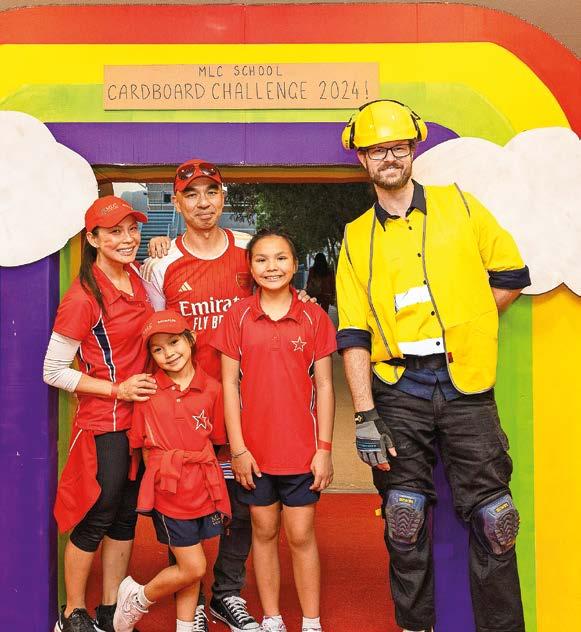

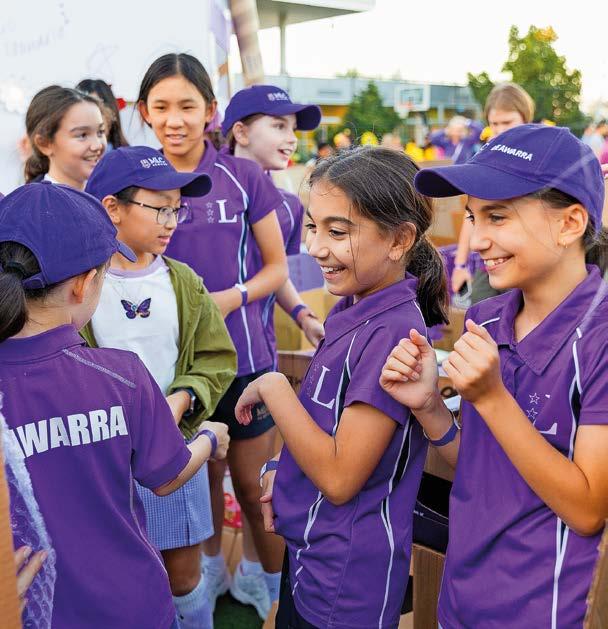

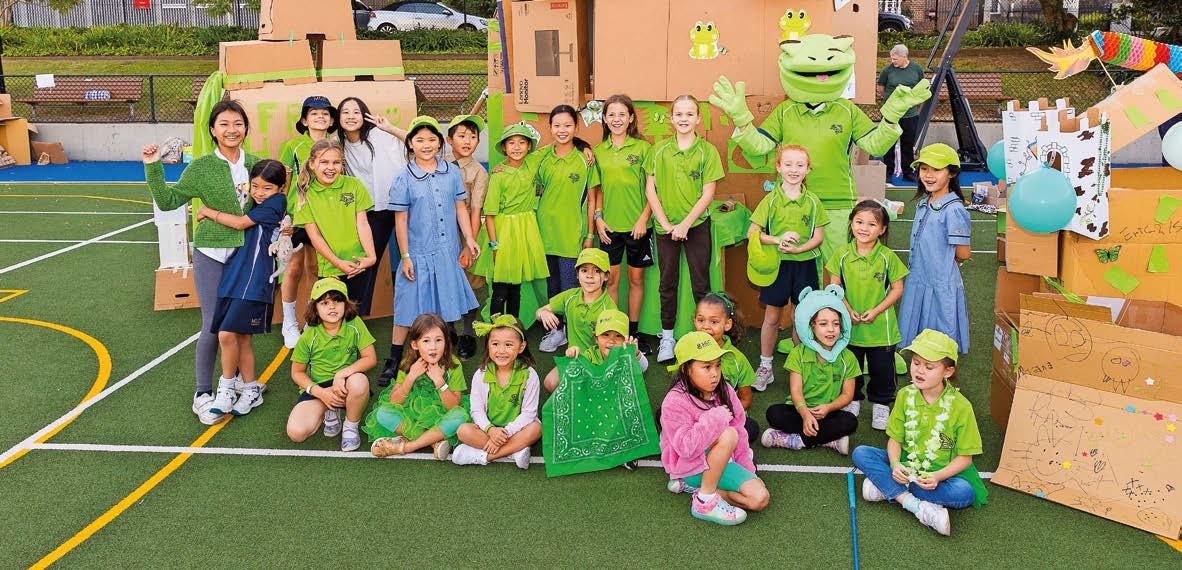
41 LUCIS AUTUMN/WINTER 2024

A Welcome Occasion
It was a great relief that the rainy weather held off for the Principal’s Parent Welcome, a much-anticipated evening to start the year.
Parents, carers, staff from the Junior School, Senior School, Executive and Council members gathered in the Bird Bath Quad for a casual get-together. Catering from a range of food trucks, cosmopolitans and a band provided the perfect backdrop for conversation amongst friends (new and old).
42 MLC SCHOOL
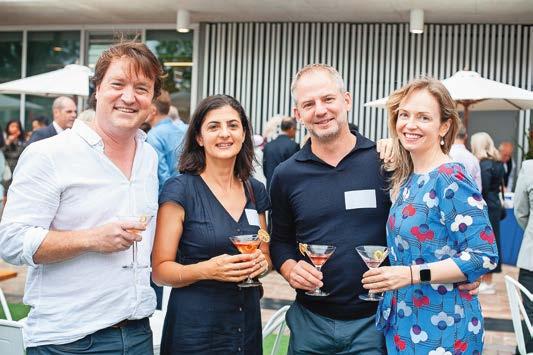

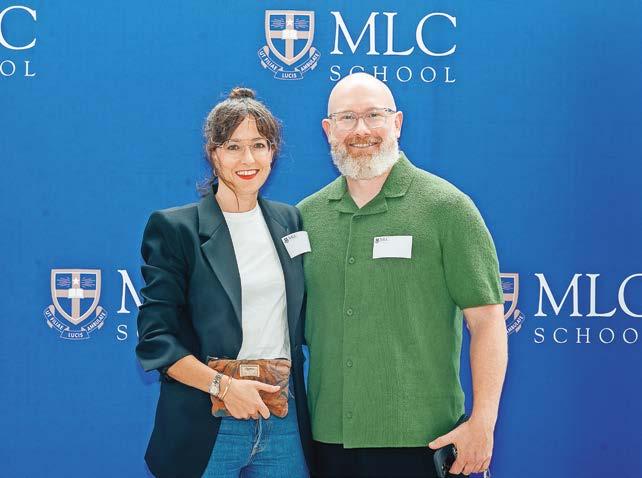




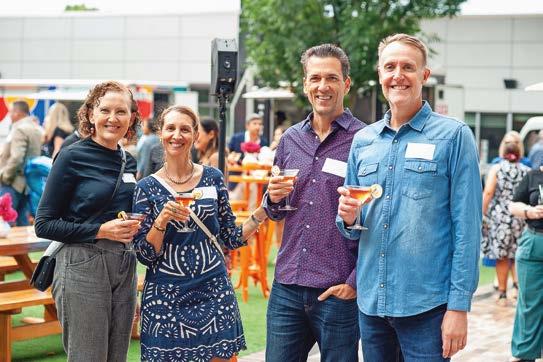
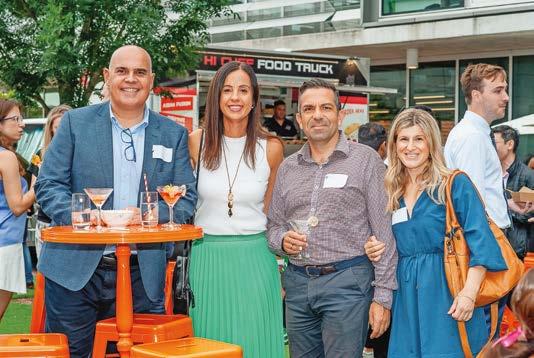
43 LUCIS AUTUMN/WINTER 2024
A Sign of the Times

With a sprawling campus spread across several streets, navigating to various places in and around MLC School can often be challenging for visitors and guests.
44 MLC SCHOOL

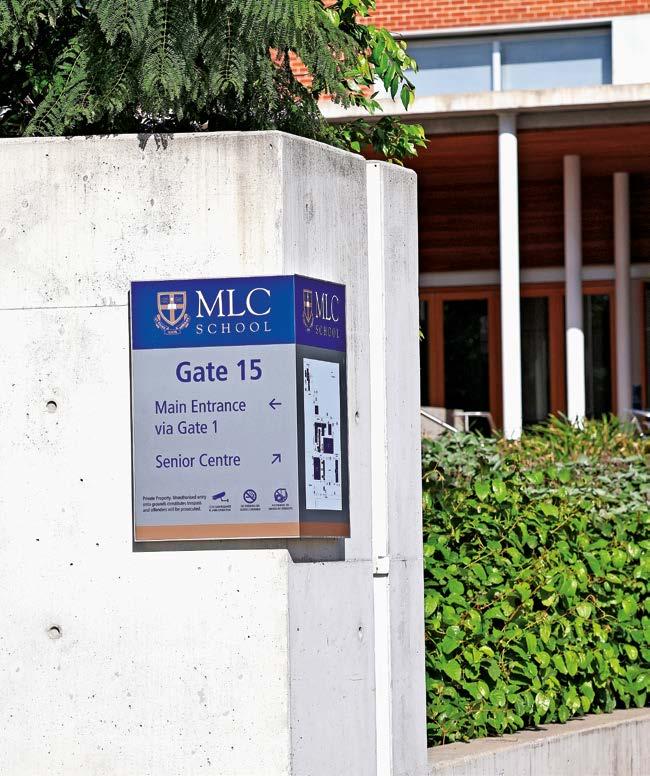
‘Finding your way around is half the battle for anyone who steps on site, but we also need to balance that with the safety of the girls at all times’ says Michele Dunn, Head of Marketing and Community Relations.
Over the last six months, a full wayfaring strategy for the entire MLC School campus has been developed and the first stage sees new numbered entry gate signs installed as well as maps and internal directional signs.
All gates have been numbered and key entry sites were identified as:
• Main Entrance (Gate 1)
• Uniform Shop, Drama Theatre and Potts Hall (Gate 2)
• Music Centre (Gate 8)
• Kent House (Gate 12)
• Senior Centre, Bird Bath Quad and Boarders' Quad (Gate 15)
• Sports Field (Gate 16 and Gate 21)
• Junior School (Gate 19) and Car Park [Junior School] (Gate 27)
The cohesive look and feel will also provide a more uniform experience, while contemporising and beautifying spaces aesthetically.
Parents and carers who visit the Junior School Car Park for the first time will now be guided by a large blue wall and Gate number map to assist with finding the Junior School building site. The Daphne Line Hall, where many community events are held, will also be easily identifiable, with a large blue sign visible from the walkway along the Sports Field side of the Junior School building. The Junior School has received an impressive silver sign at the Junior School Reception entrance and a Gate number map on Park Road.
Those who have found themselves in the middle section of the Senior School campus, perhaps on a Friday night looking for Debating will find a totem to provide multi-directional guidance.
This extensive long-term investment in the School's signage infrastructure aims to create a positive and welcoming environment for all visitors for many years to come.
The commitment to continual improvements across the large MLC School campus often requires collaboration across several behind-the-scenes staff such as the School’s Facilities team, Finance team, and Marketing and Community Relations team.
45 LUCIS AUTUMN/WINTER 2024
Uniform Shop
Potts Hall
Drama Theatre
Service Entrance
Staff Car Park (Music Centre)
Senior Centre (Park Road)
Bird Bath Quad
Boarders' Quad
Sports Field
Facilities Entrance
DID YOU KNOW? MLC School’s campus spans 4.16 hectares* *AS AT FEBRUARY 2024 Gordon Street Mt Pleasant Aveune Burwood Park Britannia Avenue Comer Street Rowley Street Grantham Street Park Road Vehicle Entrance to Car Park Service Entrance to Car Park Junior School Sports Field Senior School Reception Main Entrance Service Entrance Access from Car Park to Lift Overflow Parking 12 8 27 2 7 4 15 19 17 16 KEY MLC School Gates 21 Aquatic Centre Reception
Main Entrance/Reception
Music Centre
Kent House
Junior School Reception Third Floor The Daphne Line Hall Car Park (Junior School) 1 8 19 2 12 15 27 4 16 21 7 17 46 MLC SCHOOL
2024 Dates to Note
Term 2
Senior School Drama Production Wednesday 6 to Saturday 8 June
Illuminate Thursday 13 June
Town Hall Music Concert Wednesday 19 June
Term 3
P&F Forum with Paul Dillon Wednesday 24 July
Father’s Day Breakfast Friday 30 August
Valedictory Week Monday 16 to Thursday 19 September
O ld Girls Events
Old Girl's Union (OGU) Meeting
Share your news!
We very much encourage and welcome your news and love to receive photos.
To get in touch, please contact Barbara Hoffman, MLC School Archivist, on 02 8741 3214, or email bhoffman@mlcsyd.nsw.edu.au
Wednesday 22 May
Old Girl's Union (OGU) Meeting Wednesday 14 August
Old Girl's Union (OGU) Chocolate Recess Monday 16 September
Old Girl's Union (OGU) Meeting
Wednesday 6 November
MLC School respects the environment.
The sleeve that is used to protect LUCIS is 100% compostable (made from corn starch). Please dispose of it via your recycling bin or a compost bin.
JOIN THE ONLINE NETWORK FOR MLC SCHOOL OLD GIRLS
Like to reconnect with former classmates? Want to find out what’s happening?
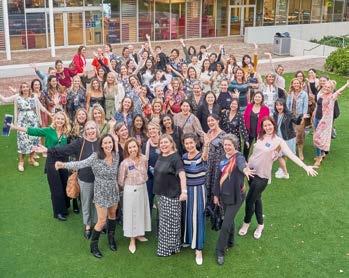
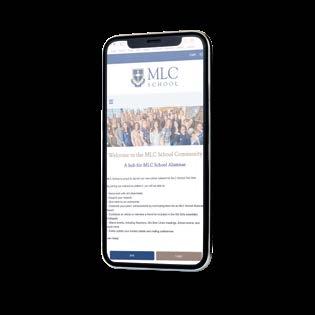
Tuesday 20 August 2024, 10.30am Scan to register for a tour or email enrol@mlcsyd.nsw.edu.au. BOOKINGS ARE ESSENTIAL AS TOUR DAYS REACH CAPACITY MANY WEEKS BEFOREHAND.
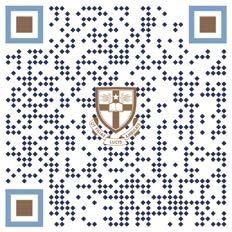
Update your contact details and mailing preferences, expand your network, attend events such as Reunions, Old Girls’ Union meetings, School events and lots more.
Scan to join and stay connected today! Or visit community.mlcsyd.nsw.edu.au
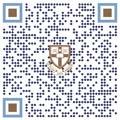
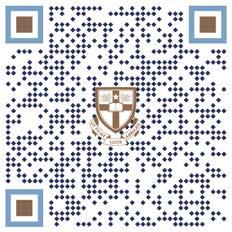
Scan for a virtual fly-through tour or visit https://mlcsyd.youtour.com.au/
2024 SCHOOL TOUR DATES
24/7
360 °
Wangal Country Rowley Street, Burwood NSW 2134 Australia PO Box 643 Burwood 1805 Ph +61 2 9747 1266 Fax +61 2 9745 3254 enquiries@mlcsyd.nsw.edu.au ABN 84 645 102 325 | CRICOS No. 02328D mlcsyd.nsw.edu.au MLC SCHOOL A UNITING CHURCH DAY SCHOOL FOR GIRLS, PRE-KINDERGARTEN TO YEAR 12















































 Year 11 Unite
Year
Year 11 Unite
Year






















































































